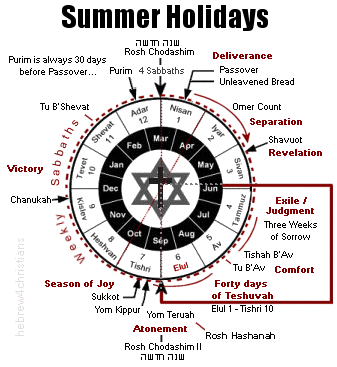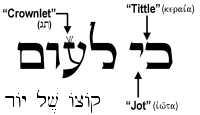|
Jewish Holiday Calendar
For June 2018 site updates, please scroll past this entry....
In the summer there occurs a three week period of mourning that begins with the Fast of Tammuz and ends with Tishah B'Av. The last nine days of this three week period (i.e., from Av 1 until Av 9th) are days of increased mourning. However, after this somber time, the romantic holiday of Tu B'Av, the 15th of Av occurs. Summer ends with the 30 days of the month of Elul, a yearly season of teshuvah (repentance) that anticipates Rosh Hashanah and the fall holidays. The 30 days of Elul are combined with the first 10 days of the month of Tishri to create the "Forty Days of Teshuvah" that culminate with Yom Kippur.
Because they occur between the spring and fall holidays, the summer holidays help us prepare for the second coming of the Messiah:
The Summer Holidays:

Note that in accordance with tradition, holiday dates begin at sundown. Moreover, some holidays may be postponed one day if they happen to fall on the weekly Sabbath:
- Month of Tammuz (Tues., June 12th [eve] - Thurs. July 12th [day])
- Month of Av (Thurs. July 12th [eve] - Fri. Aug. 10th [day])
- Month of Elul (Fri. Aug. 10th [eve] - Sun. Sept. 9th [day])
- Month of Tishri (Sun. Sept. 9th [eve] - Mon. Oct. 8th [day])
Note: For more about the dates of these holidays see the Calendar pages....
June 2018 Updates
Note: If any page content appears to be missing, click: refresh the page...
Blessing of Inner Peace...

[ In our Torah portion this week (Balak), we read how Balaam intended to curse the Israelites, but God "took hold of his tongue" and made him bless the people instead... ]
06.29.18 (Tammuz 16, 5778) It is remarkable that the traditional morning blessing recited at synagogues around the world begins with words attributed to Balaam, the enigmatic and self-styled prophet: Mah Tovu: "How lovely are your tents, O Jacob; your dwelling places, O Israel!" (Num. 24:5). The sages say that the word "tent" (אהֶל) refers to the inner life – how we really feel inside – whereas the word "dwelling" (מִשְׁכָּן) refers to the outer life - our place or circumstances. Together, the inner and the outer mark the quality of our lives, but the inner is the starting point, since we must first learn to live in peace with ourselves. This is vital: we must first tolerate our shortcomings and practice compassion toward our frail humanity... This is sometimes called shalom ba'bayit, "peace in the home" (of the self). Such inner peace is the greatest of blessings, since without it we will cling to pain, fear, and anger, thereby making us unable to find our place at the table in God's kingdom of love.
מַה־טּבוּ אהָלֶיךָ יַעֲקב
מִשְׁכְּנתֶיךָ יִשְׂרָאֵל
mah · to·vu · o·ha·le·kha · Ya·a·kov
mish·ke·no·te·kha · Yis·ra·el

"How lovely are your tents, O Jacob,
your dwellings, O Israel"
(Num. 24:5)

Shabbat shalom and love to you. Thank you for praying for Hebrew for Christians...
Return to your heart...
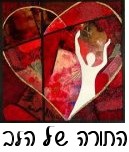
06.29.18 (Tammuz 16, 5778) In the Torah we read, "Know therefore today and return to your heart (וַהֲשֵׁבתָ אֶל־לְבָבֶךָ), for the LORD is God in heaven above and on the earth beneath; there is no other" (Deut. 4:39). Here again we see the centrality of the heart as the mode to encounter God (Luke 17:21). Savor the phrase, "Know therefore today and return to your heart..." It the heart that is the place of connection with God... As Yeshua said, "Behold, I stand at the door and knock. If anyone hears my voice and opens the door, I will come in to him and eat with him, and he with me" (Rev. 3:20). Today is the day to "return to your heart" and receive again God's love for your soul... Shabbat shalom chaverim...
Faith, hope and love...

06.29.18 (Tammuz 16, 5778) I wrote recently that having faith in God (אמונה ביהוה) implies having faith in your value in God's eyes, and therefore genuine faith never leads you to self-hatred or self-abuse. You love yourself as you love God, and these are intimately connected and cannot be separated (1 John 4:19). The life of faith begins with Shema, that is, hearing the great prophetic invitation to love: "You shall love the LORD your God with all your heart, with all your soul, with all your being" (Deut. 6:4-5). This call to love is central to faith, just as the very first commandment is to trust that God's love is "for you" love: "I am the LORD your God" (Exod. 20:2). This is Torah of Yeshua - to know and to experience the truth of God's great love (John 14:23; 15:9, 12). Indeed each of the Ten Commandments (עשרת הדיברות) express the obligation to walk in the truth of love: 1) "I am the LORD your God" (אָנֹכִי יְהוָה אֱלֹהֶיך) implies you believe in your eternal significance and your place in God's heart; 2) "have no other gods before me" implies that your identity is bound up in the passion of your heavenly Father; 3) "do not take the name of the LORD in vain" means all that you do and say carries eternal weight (Matt. 12:36-37); 4) "remember the Sabbath" means letting go and surrendering to God's care, trusting in his salvation performed on your behalf; 5) "honor your parents" signifies that your story is important and who you are matters; 6) "do not murder" implies that you renounce self-abuse, turning away from damaging fears and anger to face the light; 7) "do not commit adultery" implies being conscious that all of life has sanctity and should be revered; 8) "do not steal" means respecting the boundaries and contours of life, accepting the gift of the present moment; 9) "do not lie" means receiving who you are and affirming the truth of God's blessing; and 10) "do not covet" means forsaking resentment and envy, walking in peace, set free from enslaving desires, and relying on God's care for your life. Faith in God, then, means believing that God loves and entirely accepts you (despite your sins and wretchedness) and that moreover God will never leave nor forsake you. So be strong and of good courage, friends. We are confident of this very thing, "that the One who began a good work in you will bring it to completion upon the Day of Yeshua the Messiah" (Phil. 1:6; see also 2 Cor. 9:8; 2 Thess. 1:11; Heb. 13:20-21). Amen. God is love and Torah expresses God's love (1 Tim. 1:5).
We believe that God gave up his heart for us so that we may be given a heart... We believe that God deemed us worth saving, that his heart reaches to the uttermost to heal those who trust in him... We believe that God esteems us worth the very sacrifice of Yeshua so that we can be given the blessing of eternal life, etc. Responding to God's love is the essence of teshuvah.
Curses turned to Blessings...
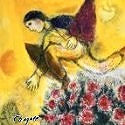
[ In our Torah portion this week (Balak), we read how Balaam intended to curse the Israelites, but God "took hold of his tongue" and made him bless the people instead... ]
06.28.18 (Tammuz 15, 5778) The story of Balaam took place "out of view" of the Israelites, which teaches us that the LORD our God is always at work - even among our enemies - for our blessing and ultimate good... No weapon formed against God's people shall prosper, and every tongue that speaks in judgment shall be made to stammer out praise. "He who vindicates us is near; who will contend with us?" Indeed, "who shall bring any charge against God's elect? It is God who justifies. Who is to condemn? Yeshua the Messiah is the one who died -- more than that, who was raised -- who is at the right hand of God, who indeed is interceding for us" (Rom. 8:33-34). Those of faith understand history - including the End of Days - as the expression of God's sovereign and providential hand. The gracious Savior always works "all things together for the good" of those who are trusting in Him.
God turns curses into blessings... For example, Joseph was blessed despite the ill-will of his brothers: "You devised evil against me, but God devised it for good" (Gen. 50:20). Note that the same verb for "devised" (i.e., chashav: חשׁב) is used to describe both the evil intent of the brothers and the good intent of the Lord. This teaches us that God overrules the malice of men to effect his own good purposes, and therefore we can rightfully affirm gam zu l'tovah (גַּם זוּ לְטוֹבָה), "this too is for good" (Rom. 8:28). Underlying the surface appearance of life (chayei sha'ah) is a deeper reality (chayei olam) that is ultimately real, abiding, and designed for God's redemptive love to be fully expressed. Resist the temptation, therefore, to judge by mere appearances. Forbid your troubles to darken the eye of your faith. Do not unjustly judge God's purposes or try to understand His ways. As the story of Balaam shows, God makes even the wrath of man praise Him (Psalm 76:10). "Then God opened Balaam's eyes, and he saw the Angel of the LORD (מַלְאַךְ יְהוָה) standing in the way, with his drawn sword in his hand. And he bowed down" (Num. 22:31). Indeed, every knee will bow to the LORD our God and Savior (Isa. 45:22-23; Phil. 2:10-11).
פְּנוּ־אֵלַי וְהִוָּשְׁעוּ כָּל־אַפְסֵי־אָרֶץ
כִּי אֲנִי־אֵל וְאֵין עוֹד
בִּי נִשְׁבַּעְתִּי יָצָא מִפִּי צְדָקָה
דָּבָר וְלא יָשׁוּב
כִּי־לִי תִּכְרַע כָּל־בֶּרֶךְ תִּשָּׁבַע כָּל־לָשׁוֹן
pe·nu · e·lai · ve·hiv·va·she·u ·kol ·af·sei ·a·retz
ki · a·ni · El · ve·ein · od
bi · nish·ba·ti · ya·tza · mi·pi · tze·da·kah
da·var · ve·lo · ya·shuv
ki · li · tikh·ra · kol · be·rekh · ti·sha·va · kol · la·shon

"Turn to me and be saved, all the ends of the earth!
For I am God, and there is no other.
By myself I have sworn; from my mouth has gone out in righteousness
a word that shall not return:
"To me every knee shall bow, every tongue shall swear allegiance"
(Isa. 45:22-23)

Find comfort that the schemes of the wicked are subject to the sovereign purposes of the LORD our God. Ein od milvado (אֵין עוֹד מִלְבַדּו) - there is no power that can be exercised apart from God's consent and overarching will... Indeed all authority on heaven and earth belongs to Yeshua, the "the Ruler of the Kings of the earth" (עֶלְיוֹן לְמַלְכֵי־אָרֶץ). As it is written, "All the nations you have made shall come and worship before you, O Lord, and shall glorify your name" (Psalm 86:9). Every knee shall bow; every tongue shall confess the Truth...
Humilty and Love...
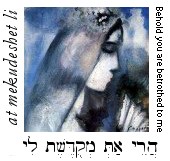
06.27.18 (Tammuz 14, 5778) "We were in our own sight as grasshoppers, and so we were in their sight" (Num. 13:33). The sages comment that when a person is small in faith, it is difficult to serve God, since having faith in God means having faith in yourself, or rather, having faith that you are known, beloved, and valued by God himself... Believing that God loves and cares for you is not vain grandiosity but expresses the utmost humility, since genuine faith understands that we are esteemed by heaven for the truth and reason of God's very own greatness. Being self-deprecating is not a sign of humility, then, but rather of unbelief... True faith, on the other hand, expresses awe over how much we are loved and humbly accepts God's affirmation and blessing... William Law once wrote: "Humility is nothing else but a right judgment of ourselves," yes, but understand such judgment to include not only awareness of our radical sinfulness and frailty but an ever greater and overcoming awareness of how much we are valued and loved by the Yeshua our LORD. Amen, you are really loved, dear friend, and this great love will deliver you from all your fears.
He is Faithful and True...

[ In our Torah portion this week (Balak), we read how Balaam intended to curse the Israelites, but God "took hold of his tongue" and made him bless the people instead... ]
06.26.18 (Tammuz 13, 5778) It is encouraging to understand that despite the repeated failures of the Israelites in the desert, the LORD never let go of his people... Indeed, as the story of Balaam reveals, if a spiritual enemy would secretly arise to curse Israel, God would take the sorcerer "by the tongue" to evoke God's blessing instead (Deut. 23:4-5). As Balaam himself attested: "there is no sorcery (i.e., nachash: נַחַשׁ) against Jacob, no divination (i.e, kesem: קֶסֶם) against Israel" (Num. 23:23). Unlike scheming Balaam, who was willing to say whatever people wanted to gain temporal reward, God is "not a man that he should lie, nor a son of man, that he should change his mind" (Num. 23:19). What the LORD has promised he will invincibly perform: His word is full of integrity and truth: "The grass withers, the flower fades, but the word of our God will stand forever" (Isa. 40:8). The God of Israel is forever faithful in his love, and no one can overrule his desire (Num. 23:20; Rom. 11:29).
Keep on Trusting...
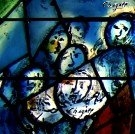
06.26.18 (Tammuz 13, 5778) When Yeshua said, "Let not your heart be troubled... I go to prepare a place for you" (John 14:1-2), he was assuring us that he had matters well under his control, and therefore we need not worry, since his passion rendered our salvation completely secure... The future is a "prepared place" for you, even if life in this world is often marked by testing and various refining fires. God has not promised to rescue us according to our own schedule, however, so if it appears that your prayers are not immediately answered, keep waiting in faith: "Rejoice, even if you have been grieved by various trials, because the tested genuineness of your faith -- more precious than gold that perishes though it is tested by fire -- may result in praise and glory and honor at the revelation of Yeshua the Messiah" (1 Pet. 1:6-7). God works "all things together for good," and since the exercise of faith is your good, he engineers all things to build your faith. "For my thoughts are not your thoughts, neither are your ways my ways, says the LORD" (Isa. 55:8).
Recall the words: "Let him who walks in darkness and has no light trust in the name of the LORD and rely on his God" (Isa. 50:10). Trusting in God (i.e., bittachon - בִּטָּחוֹן) doesn't mean that we are obligated to say this is "the best of all possible worlds," though it does mean we believe that eventually God will wipe away every tear and make all things right... Bittachon is a word for this world, which says, "Though he slay me, I will trust in him..." Those who call upon the LORD can trust not only in concealed good behind ambiguous appearances ("all things work together for good") but also in a future, real, substantive good that will one day be clearly manifest for us all... We fight the "good fight" of faith, which is a worthy struggle that eventually is realized for blessing. Meanwhile, may the LORD our God keep us from such depth of sorrow that leads to sickness, darkness and despair.
The very last promise of Scripture is "I come quickly" (אֲנִי בָא מַהֵר) and the last prayer is, "Amen, come, Lord Yeshua" (אָמֵן בּאָה־נָּא הָאָדוֹן יֵשׁוּעַ) [Rev. 22:20]. Meanwhile we "inwardly groan" for the fulfillment of our redemption; since presently we are suspended between worlds, walking in hope yet subject to the vanities that befall all flesh. And though God may tarry, He declares, "I am the LORD; in its time I will hasten it" (Isa. 60:22). So we are made captives to hope, clinging to the promise of our ultimate healing and redemption. Our hearts therefore affirm that God is faithful "to keep you from falling, and to present you faultless before the presence of his glory with exceeding joy" (Jude 1:24). Amen. God will help us before He will help us, and may He come speedily, and in our day....
Uncovering of Eyes...
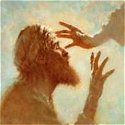
[ The following entry concerns this week's Torah reading, parashat Balak... ]
06.26.18 (Tammuz 13, 5778) From our Torah portion this week we read: "Then the LORD uncovered Balaam's eyes and he saw..." (Num. 22:31). This implies that the great "seer" had been walking "sightlessly" – blind to reality, closed off, unable to get past his own narrow perspective... Indeed the Hebrew verb for "uncovered" (i.e., galah: גָּלָה) implies captivity and exile (i.e., galut: גָּלוּת). Seeing is essentially a spiritual act – a decision of the will - though to see the truth about reality requires the miracle from God... Just "as the hand held before the eye conceals the greatest mountain," so we hide from view the mysteries and glories that surround our way. Like the man born blind who needed a miracle to see the world around him, so we are delivered from our blindness only when God reaches down and touches us so we can see (John 9). "Amazing grace... I once was lost, but now am found; was blind, but now I see."
אַל־תַּסְתֵּר פָּנֶיךָ מִמֶּנִּי
al · tas·teir · pa·ne·kha · mi·me·ni

"Do not hide your face from me"
(Psalm 27:9)

This is such an important appeal – to be enabled by the miracle to see God's face in all things, in every person we encounter, and in every experience we have... Amen.
Freedom of Self-Forgetfulness

06.25.18 (Tammuz 12, 5778) Surely the self is the prison that binds the soul... And he said to all, "If anyone would come after me, he must deny himself (ἀρνησάσθω ἑαυτὸν), take up his cross daily, and follow me. For whoever would save his life will lose it, but whoever loses his life for my sake will save it" (Luke 9:23-24). Note that the Greek verb translated "deny" in this verse means to forget yourself, or to quit thinking about yourself (from α-, "not," +ῥέω, "to speak"). Rather than abstaining from your carnal desires, then, denying yourself really means joyful self-forgetfulness. You are set free from the clamor of the self because your heart is focused on something so much greater and wonderful.
In light of this, we must soberly assess how much of our suffering is caused because the self, or the ego, refuses to let go and die? How much pain is produced because we "remember" ourselves, we think of ourselves first, we put our fear of loss or our desire for comfort above everything else? Is not such selfishness the essence of sin? Yeshua tells us to take up the cross and die daily because that which is dead no longer suffers from ambivalence and selfish inner conflict... There are no "half-measures" in this approach to life. We are not to "heal" what is intended to die. If we truly take up the cross and die to ourselves, our struggle with the flesh would be over. All spiritual truth leads us to this place, to the constant practice of dying to the flesh. The pain we sometimes feel is from the flesh that still clings to this life.
We need courage to let go and trust. "Do you fear that He may not be able to supply from Himself that help which He may have taken away on a human level? And why does He take human help away, except to supply you with Himself?" (Fenelon). God has to remove all that we rely upon other than Himself so that we understand that He alone is all we need. As Kierkegaard wrote, "It is terrifying when God takes out the instruments for the surgery for which no human being has the strength: to take away a person's human zest for life, to slay him – in order that he can live as one who has died to the world and to the flesh. It cannot be otherwise, for in no other way can a human being love God..." May it please the LORD to help us deny ourselves and take up the cross daily... Amen.
Three Weeks of Sorrow...

06.25.18 (Tammuz 12, 5778) According to Jewish tradition Moses shattered the tablets on the 17th day of the 4th month, after he came down from Mount Sinai and found the people worshipping the Golden Calf. Today, this tragic date is commemorated as a fast day (i.e., the "Fast of Tammuz"), which marks the beginning of a three week period of mourning that culminates on the 9th of Av (i.e., "Tishah B'Av"), the date the Israelites were sent into exile from the promised land because they believed the evil report of the spies (Num. 14:20-35).
During this three week period of national mourning, the weekly readings from the prophets are all "Haftarahs of Rebuke" that warn the people about imminent judgment from heaven, and therefore the theme of most Jewish religious services is teshuvah (repentance). In addition, weddings or other joyous events are usually not held during this time of year. Indeed, among the very Orthodox, the last nine days of the three weeks are the most rigorous and solemn. Beginning on the first day of the month of Av, traditional mourning customs are practiced in anticipation of the most solemn fast day of Tishah B'Av, when the Book of Lamentations (Megillat Eichah) is plaintively recited during the evening service.
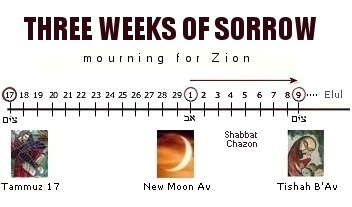 |
Dates During the Three Weeks of Sorrow:
Folly of the Wicked...
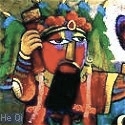
06.24.18 (Tammuz 11, 5778) Our Torah portion for this week (i.e., parashat Balak) is named after a fretful Moabite king (בָּלָק) who sought to curse the Jewish people by hiring the services of a wicked Midianite "prophet" named Balaam (i.e., bil'am: בִּלְעָם). King Balak's plan was to employ Balaam's sorcery (i.e., kashafut: כַּשָׁפוּת) against the Israelites to prevent them from entering the Promised Land. Similar to the delicious irony that befell the villain Haman in the Book of Esther, however, King Balak's scheme was upended, and the curse he sought to put on the Jewish people was repeatedly pronounced as a blessing by Balaam instead. After several foiled attempts, Balak fretfully dismissed the prophet, but before departing from the dejected king, Balaam ironically prophesied the destruction of the Moabites and the victorious establishment of Israel. The shameful story of Balaam reveals that "there is no enchantment against Jacob, no divination against Israel" (Num. 23:23). Ein od milvado (אֵין עוֹד מִלְבַדּו) - no weapon or scheme devised against God will ever prosper (Isa. 54:15-17).
But who was this mysterious prophet named Balaam? According to Jewish tradition, Jacob's wicked uncle Laban had a son named Beor (בְּעוֹר), who became the father of Balaam. In other words, the "cursing prophet" Balaam was none other than the grandson of Laban:
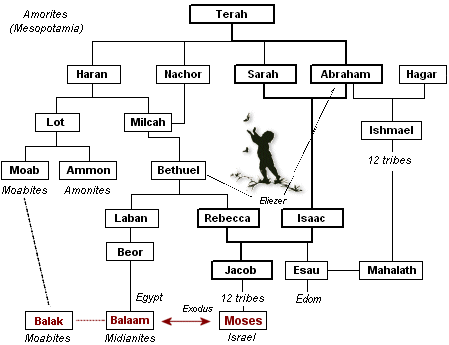 |
Note that the name "Beor" first appears in connection with a king of Edom (Gen. 36:32), which suggests that Balaam might have once been a king of the Edomites (i.e., the descendants of Esau). Further note the phonetic similarity to Peor. If Beor and Peor are the same, then Balaam was actually a prophet of Baal Peor, a local Semitic god.
Balaam was regarded as a great seer, magician and an adept in the occult. He had an "evil eye" and drew the spirit of demons to anything he gazed upon (Avot 5:22). His notoriety made him famous, and powerful people asked him to invoke curses on their enemies. The Talmud (Sanhedrin 106a) states that Balaam became so famous as a magician that he later became a chief advisor to Pharaoh. It was Balaam who advised the new Pharaoh to enslave the Israelites and to afflict them with brutal taskmasters (Exod. 1:8-11). For more information about the identity of Balaam, see the entry entitled, "The Curses of Balaam."
Enduring Suffering (סַבְלָנוּת)

06.22.18 (Tammuz 9, 5778) In times of severe testing people often do not need further teaching, but rather "endurance," or what the New Testament calls hupomone (ὑπομονή), a word that means "remaining [μένω] under [ὑπο]" the Divine Presence while being tested. Suffering people do not need moral platitudes from others, but only the will to believe, the resolution to stay constant, and to ability breathe out simple prayers for help to the LORD: "God have mercy..." "Help me, O God..." "I need Thee, O Lord..." When we receive grace to faithfully suffer, we hear the Spirit whispering back to us: "Be not afraid..." "Live in me..." "Walk in the light..." "I am with you always..." "You are loved..."
רְפָאֵנִי יְהוָה וְאֵרָפֵא
הוֹשִׁיעֵנִי וְאִוָּשֵׁעָה כִּי תְהִלָּתִי אָתָּה
re·fa·ei·ni · Adonai · ve·ei·ra·fei
ho·shi·ei·ni · ve·iv·va·shei·ah, · ki · te·hil·la·ti · at·tah

"Heal me, O LORD, and I shall be healed;
save me, and I shall be saved, for you are my praise."
(Jer. 17:14)

Download Study Card
"There is no circumstance, no trouble, no testing, that can ever touch me until, first of all, it has gone past God and past Christ, right through to me. If it has come that far, it has come with a great purpose, which I may not understand at the moment..." (Alan Redpath). Amen. The only question then is whether we will trust God to help us in the tough moments of life, or if we will resort to trying to control things by our own efforts... The "Serenity Prayer" (by the late Reinhold Niebuhr) helps us find the balance we need: "God grant us the serenity to accept the things we cannot change; the courage to change the things we can, and the wisdom to distinguish the one from the other." Shabbat shalom chaverim.
Heavenly Consolations...
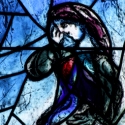
06.22.18 (Tammuz 9, 5778) "The LORD ... has sent me to bind up the brokenhearted, to proclaim liberty to the captives, and the opening of the prison to those who are bound" (Isa. 61:1). Note here that Messiah our Savior (משיח מושיענו) was explicitly sent to "bind up" the wounds of the brokenhearted. The Hebrew verb chavash (חָבַשׁ), "to bind up," can also mean to govern or to restrain... The LORD is near to the nishbar lev, the one with a broken heart. He restrains its woundedness and salves its hurt (Psalm 34:18). The Hebrew word "lev" (לב) metaphorically refers to our inner life, that is, our affections, mind, and will. This is revealed in the letters of the Hebrew word itself: the Lamed (ל) depicts a "staff" used to direct something (i.e., the will), and the Bet (בּ) depicts the "house" of the physical body. Lev then represents our inner life of thought and feeling expressed in our actions. Those who are broken in heart – the nishberei lev (נִשְׁבְּרֵי־לֵב) – have discovered that they cannot control their own lives, that they are inwardly "shattered," and therefore need divine help. Yeshua comes to those who are "poor in spirit" and viserally humbled by their sin; He is near to those cut to the heart, to those who have bruised and wounded spirits and who live in great pain. It is for these the Savior rises to bring comfort....
This seems to be the divine pattern. "Truly, truly, I say to you, unless a grain of wheat falls into the earth and dies, it remains alone; but if it dies, it bears much fruit" (John 12:24). The hard "outer shell" of the seed must be broken so that the life of the Spirit can come through... Plainly put, God (and only God) can "deconstruct" the self so that life's priorities, focus, and passions are redirected to Him alone, the true Source of life.
Cleansing from Death...
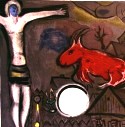
[ The following entry concerns this week's Torah reading, parashat Chukat, though the mysterious themes of purity and impurity were first described in parashat Tzav... ]
06.22.18 (Tammuz 9, 5778) Contact with the dead causes spiritual impurity (i.e., tumah) because death, as the separation from life, is the ultimate expression and consequence of sin. People routinely deny the meaning of death, explaining it away as the result of some cause from which one might escape ("he worked too hard," "she got sick," "it was an accident," etc.). People rationalize death because they refuse to see it as the effect of sin, the consequence of the original transgression of Adam and Eve that humanity as a whole has "inherited" (Gen. 2:17; 3:19; Rom. 5:12). Therefore the Torah states that the birth of a child results in impurity (Lev. 12:2,7). Full atonement comes from "digging up the root of sin" by being purified from its source, namely, the curse of death itself. The Red Heifer alludes to the sin of the Golden Calf, which finds its source in the original idolatry of Adam and Eve. Even the blood of the sacrifice was burned to ash "outside the camp," putting a complete end to the "life of death" and its power to corrupt. The Red Heifer is therefore a special sort of "sin offering" (chatat) that cleanses from contact with death itself (Num. 19:9).
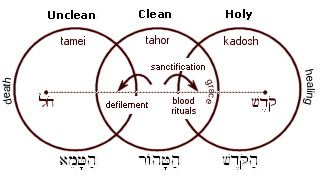 |
Note: The "fall" of man implies that we have contact with death - both inwardly and outwardly. The sacrifice of Yeshua as our "Red Heifer" cleanses us from all tumah and lovingly makes us clean (tahor) before the Father. The "water and the blood" is part of the "olah sacrifice" of Yeshua for our redemption and purification before God offered at Calvary (John 19:34, 1 John 5:6). The water and blood flowing from His wounds are the means by which we are purified from sin and death... All this comes from the love (chesed) of God given in our Messiah and Savior. Just as the sacrifice of the Red Heifer cleansed from the effects of physical death, so the sacrifice of Yeshua cleanses us from the effects of spiritual death. For more on this subject, see the "Gospel of the Red Cow."
The New Creation of Messiah...
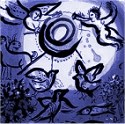
06.22.18 (Tammuz 9, 5778) Why do we seem to forget that we are incorrigible sinners in need of a miracle? Why do we have trouble admitting the truth about our great need? The Scriptures admonish: "Confess your faults one to another, and pray one for another, that you may be healed. The prayer of a righteous person has great effectiveness" (James 5:16). Notice that the prayer of the righteous is effective because it is grounded in reality. "Confession" (i.e., ὁμολογία) means forsaking pretense by accepting the truth about yourself; it means "saying the same thing" (ὁμολογέω) that reality reveals... It has been said that we are only as sick as the secrets we keep. The LORD is the God of Truth (אֵל אֱמֶת), and the Spirit of Truth (רוּחַ הָאֱמֶת) testifies to the honest of heart... God does not encounter fictional sinners, but only real and awful ones... He is not interested in the "outside of the cup" as much as what the cup contains, that is, with the inner recesses of heart. If you haven't discovered how difficult obedience is, then you've but trifled with the idea of obedience. The Savior is not merely a "helper" who enables us to "keep it together," but is the One who delivers us from the real, grievous, and most damnable of iniquities by means of the intervention of his Divine Power. The seriousness of our condition is measured by the seriousness of its cure - namely, by the sacrifice of God the Son upon the cross for our sins.
לֵב טָהוֹר בְּרָא־לִי אֱלהִים
וְרוּחַ נָכוֹן חַדֵּשׁ בְּקִרְבִּי
lev · ta·hor · be·ra·li · E·lo·him,
ve·ru·ach · na·khon · cha·desh · be·kir·bi

"Create for me a pure heart, O God,
and renew a right spirit within me"
(Psalm 55:10)

Hebrew Study Card
As a reminder, recall that When King David cried out to the Lord, "Create in me a clean heart, O God," he did not use the Hebrew word yatzar (יָצַר), which means to "fashion" or "form" something from pre-existing material (Gen. 2:7), but he instead used the word bara (בָּרָא), a verb exclusively used in the Torah to refer to God's direct creation of the cosmos (Gen 1:1). In other words, King David understood that no amount of reformation of his character would be enough, and therefore he appealed to that very power of God that alone could create yesh me'ayin, or "out of nothing." Such was the nature of the remedy required.
It is written in our Scriptures: "By the word of the LORD were the heavens made; and all the host of them by the breath of his mouth" (בִּדְבַר יְהוָה שָׁמַיִם נַעֲשׂוּ וּבְרוּחַ פִּיו כָּל־צְבָאָם; Psalm 33:6). All that exists was made by the Word of God, and without Him nothing exists at all (πάντα δι᾽ αὐτοῦ ἐγένετο, καὶ χωρὶς αὐτοῦ ἐγένετο οὐδὲ ἕν; John 1:3). "All things were created by Him (i.e., Yeshua), and for Him" and in Him all things consist (συνεστηκεν, lit. "stick together") (Col. 1:16-17). Regarding our redemption and the end of our salvation it is written: "Behold I am making all things new" (ἰδοὺ καινὰ ποιῶ πάντα; Rev. 21:5). Amen. God "calls into being that which does not exist" (καλοῦντος τὰ μὴ ὄντα ὡς ὄντα; Rom. 4:17). There is a new reality that comes into being within the heart regenerated by Yeshua: "For neither circumcision counts for anything, nor uncircumcision, but a new creation" (הַבְּרִיאָה הַחֲדָשָׁה; Gal. 6:15; 2 Cor. 5:17). This world is part of the old order; there is a new world coming! כִּי־הִנְנִי בוֹרֵא שָׁמַיִם חֲדָשִׁים וָאָרֶץ חֲדָשָׁה וְלֹא תִזָּכַרְנָה הָרִאשֹׁנוֹת וְלֹא תַעֲלֶינָה עַל־לֵב - "For, behold, I create new heavens and a new earth: and the former shall not be remembered, nor come into mind" (Isa. 66:17). "The current galaxies and earth are fuel for the final fire. God is poised, ready to speak his word again, ready to give the signal for the judgment and destruction of the desecrating skeptics... But when the Day of God's Judgment does come, it will be unannounced, like a thief. The sky will collapse with a thunderous bang, everything disintegrating in a huge conflagration, earth and all its works exposed to the scrutiny of Judgment. Since everything here today might well be gone tomorrow, do you see how essential it is to live a holy life? Daily expect the Day of the LORD, eager for its arrival. The galaxies will burn up and the elements melt down that day -- but we'll hardly notice. We'll be looking the other way, ready for the promised new heavens and the promised new earth, all landscaped with righteousness. So, my dear friends, since this is what you have to look forward to, do your very best to be found living at your best, in purity and peace." (2 Pet. 3:7-14, The Message paraphrase).
Our Great Need to Forgive...

06.21.18 (Tammuz 8, 5778) In the Gates of Repentance it is written: "I hereby forgive all who have hurt me, all who have wronged me, whether deliberately or inadvertently, whether by word or by deed. May no one be punished on my account. And as I forgive and pardon those who have wronged me, may those whom I have harmed forgive me, whether I acted deliberately or inadvertently, whether by word or by deed." Amen...
Yeshua taught us to pray "forgive us as we forgive others," which implies that our forgiveness (of others) is the measure of our own forgiveness. In other words, as we forgive others, so we experience forgiveness ourselves... Forgiveness releases the hurt, the anger, and the disappointment so these feelings do not inwardly consume and exhaust our souls. And yet forgiveness must be self-directed, too, since refusing to forgive yourself denies or negates the forgiveness given from others. Forgiving yourself means admitting that you act just like other people, that you are human, and that you are in need of reconciliation too. We have to move on, past the shame, and to turn back to hope. As a Yiddish proverb puts it, "You are what you are, not what you were..."
It is written, "in many things we offend all," and therefore we must confess our sins one to another to find healing (James 5:16). However the practice of love overlooks a multitude of sins, and if we do not condemn those who offend us, then we will not need to forgive them for their offenses. Walking in God's love sets us free from the slavery of negative emotions such as resentment, bitterness, anger, unresolved grief, and so on.
I love this affirmation and prayer attributed to Eusebius of Caesarea (c. 263-339 AD): "May I be the friend of that which is eternal and abides. May I never quarrel with those nearest me; and if I do, may we be reconciled quickly. May I never devise evil against anyone; and if any devise evil against me, may I escape uninjured and without any desire to hurt them. May I love, seek, and attain only that which is good. May I wish for the happiness of all and the misery of none. May I never rejoice in the ill-fortune of one who has wronged me. When I have done or said what is wrong, may I never wait for the rebuke of others, but always rebuke myself until I make amends."
"May I, to the extent of my ability, give all needful help to my friends and to all who are in want. May I never fail a friend in danger. When visiting those in grief, may I be able by gentle and healing words to soften their pain. May I respect myself. May I always keep tame that which rages within me. May I accustom myself to be gentle, and never be angry with people because of circumstances. May I never discuss who is wicked and what wicked things he has done, but know good men and follow their footsteps."
Our Duty to Truth...
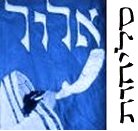
06.20.18 (Tammuz 7, 5778) Followers of the Messiah Yeshua are responsible to walk in truth and to reject what is false (1 John 4:6). This implies that we have a moral and spiritual duty to think clearly and not to abuse our minds (Phil. 4:8; Rom. 12:2). The LORD our God will help us to do this, as Yeshua said: "I will ask the Father, and he will give you a Helper (παράκλητος, someone "called to one's side"), to be with you forever, even the Spirit of Truth (i.e., ruach ha'emet: רוּחַ הָאֱמֶת), whom the world cannot receive, because it neither sees him nor knows him" (John 14:16-17). The Spirit of Truth helps us "discern what is the will of God, what is good, acceptable, and perfect" (Rom. 12:2) and empowers us to take "every thought captive" to the reality of the Divine Presence (2 Cor. 10:4-5). Truth is connected to memory - both in our personal histories as well as the history of God's redemptive actions performed on our behalf. Truth is described as "a-letheia" (ἀλήθεια), literally meaning "not forgetfulness..." Hence we are constantly commanded to remember what God has done for us and to "diligently repeat" the truth to our children (Deut. 6:4-9). Similarly, the Spirit of Truth brings to remembrance the words of Yeshua to our hearts (John 14:26).
Followers of Yeshua are commanded to love the truth and to think clearly about their faith. The ministry of reconciliation (τὴν διακονίαν τῆς καταλλαγῆς) is defined as "the word of truth, by the power of God, through weapons of righteousness" (2 Cor. 5:18, 6:7). Indeed, the word of truth (τὸν λόγον τῆς ἀληθείας) is a synonym for the "gospel of salvation" itself (Eph. 1:13; Col. 1:5; James 1:18). We are saved by Yeshua, who is the "way, the truth, and the life" (John 14:6). God commands all people to believe this truth (Acts 17:30-31; 1 Tim. 2:4). People perish because "they refuse to love the truth and so be saved" (2 Thess. 2:10-12). Therefore we see that the issue of truth is central to salvation itself....
Genuine teshuvah (repentance) implies that we will change our thinking in order to be transformed by God's truth. The follower of Messiah "cannot do anything against the truth, but only for the truth" (2 Cor. 13:8). During this Season of Teshuvah, may God help us all to think clearly and to turn our thoughts to Him. May He protect us from the vanity of a darkened mind and from all distractions that attempt to seduce us away from Him. May the LORD give us the purity of heart to know and do His will in the truth. Amen.
Personal Update: It's been rough going the few couple days over on this end. My kids are sick with the flu; my wife has been busy away from home; our car died, and the web hosting service I use for the Hebrew for Christians web site recently "updated" their servers, which means that the main site has been damaged with broken links and data loss (this happens nearly every time they do their server updates). I've been working hard the last few days repairing the damage. Thank you for your prayers for the Hebrew for Christians ministry.
Doing to Know...

[ The following concerns this week's Torah reading, parashat Chukat.... ]
06.19.18 (Tammuz 6, 5778) The commandments of God are usually divided between the rational laws (i.e., mishpatim) and the divine decrees (i.e., chukkim), though this distinction is somewhat artificial, since all of the commandments of the Torah (and that includes the Torah of the New Covenant) are grounded in the mystery of God's will, which is to say that we are to obey them simply because they derive from the Divine Authority itself... When the people gathered before Moses to receive the covenant at Mount Sinai, they said: "All the LORD has spoken we will do and we will hear" (na'aseh ve'nishmah: נַעֲשֶׂה וְנִשְׁמָע). Note the order: first comes the decision to obey (na'aseh), and then comes understanding (ve'nishmah). As Yeshua said, "If anyone's will is to do God's will, he will understand" (John 7:17). The heart of faith is willing to do what God asks before hearing what exactly is required. Many people operate the other way round, sitting in judgment of God's word, demanding to understand why they should obey. You cannot understand apart from faith, however, and that is categorically true of all forms of knowledge, which is usually defined as "justified true belief." We are to be "doers of the word and not hearers only, deceiving ourselves" (James 1:22). The Greek verb used in this verse is emphatic: "Be doers!" (γίνεσθε) means "be born! come alive! do, live, exist before God! This is a call to creative action, to newness of life!
The Scriptures state that "if anyone is a hearer of the word and not a doer, he is like a man who looks intently at his natural face in a mirror. For he looks at himself and goes away and at once forgets what he was like" (James 1:23-24). If we just hear the truth but do not act upon it, we are comically likened to someone who carefully looks at his face in a mirror but then promptly forgets what he looks like after he steps away... Likewise those who only hear the word but do not bring it to life in their deeds forget who they are and why they were created (Eph. 2:10; Titus 2:14; Col. 1:10). When we look into the mirror of truth we see our need for teshuvah and turn to God for the healing miracle he provides (Heb. 4:12). It's not about doing but being, though being is revealed in doing... If your actions do not align with your values, then back up and recover who you really are in Messiah, understand what your new nature truly is. That is what it means to "take up the yoke" of Messiah, for his yoke is easy (kal) and burden is light, and the task is to repeatedly practice allowing Him to carry your pain, shame, and sin far, far away from your heart.
There is a deeper law, however, a "mirror" that reveals something beyond our passing image. When we look intently into the "perfect law of liberty" (תּוֹרַת הַחֵרוּת וּמַחֲזִיק) - the law of faith, hope, and love for our Savior - we find blessing in our deeds (James 1:25). Note that the verb translated "look into" the law of liberty is the same used when John stooped down to "look inside" the empty tomb of Yeshua (John 20:5). The deeper law reveals the resurrection power of God's invincible love. The Torah of the New Covenant also has many mitzvot, though these are based on the love God gives to us in Yeshua: "This is my Torah: that you love one another as I have loved you" (John 13:34).
The Decree of Faith...

06.19.18 (Tammuz 6, 5778) "This is the decree of the Torah... take a red cow" (Num. 19:2). The mitzvah of the red cow is called "the" decree of Torah (חֻקַּת הַתּוֹרָה), as if it were the central mitzvah, thereby highlighting the necessity of faith, and in particular, faith that believes healing from death is obtained by a divine exchange of the pure for the impure. The idea of God's substitutionary atonement, his love that empathizes and heals you of sin - is therefore the heart of faith, the central decree of true Torah. And this, of course, is the message of the cross itself: Jesus "saves people from their sins" (Matt. 1:21). Yeshua was willing to become unclean, cut off, and the bearer of your sin so that you could be made pure, clean, and accepted in exchange (2 Cor. 5:21). May He "purge you with hyssop" so that you are made whiter than snow (Psalm 51:7).
Saved from Death's Sting...
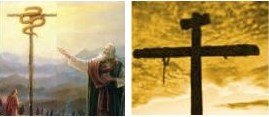
[ The following concerns this week's Torah reading, parashat Chukat... ]
06.19.18 (Tammuz 6, 5778) "Everyone who is bitten, when he sees it, shall live" (Num. 21:8). The fiery serpent – the very sting of which brings death – is what must be looked upon, confronted, and confessed. We must look at that which kills us, and by seeing it, we can then see God's miracle (נֵּס) that delivers us... Therefore we look to the cross – the place where Yeshua clothed himself with our sickness and sin – to realize God's remedy for our eternal healing. As Yeshua explained to Nicodemus, "As Moses lifted up the serpent in the wilderness, so must the Son of Man be lifted up, that whoever believes in him may have eternal life" (John 3:14-15). Humanity as a whole has been "bitten by the snake" and needs to be delivered from its lethal venom. Just as the image made in the likeness of the destroying snake was lifted up for Israel's healing, so the One made in the likeness of sinful flesh (Rom. 8:3) was to be lifted up as the Healer of the world. In Yeshua the miraculous exchange takes place: "For our sake he made him to be sin who knew no sin, so that in him we might become the righteousness of God" (2 Cor. 5:21). Bless His holy name!
Paradox and Faith (פרדוקס ואמונה)

[ The following concerns this week's Torah reading, parashat Chukat (i.e., Num. 19:1-22:1). ]
06.18.18 (Tammuz 5, 5778) The paradox of the red heifer sacrifice is precisely this: it purified those defiled by contact with death, yet it defiled all those who were connected in any way with its preparation... And though it was a prescribed sacrifice, it was offered "outside the camp," that is, on an altar that was not part of the Temple.... Likewise Yeshua suffered outside the gate to sanctify the people through his own blood.
As I discussed in the Shavuah Tov broadcast on parashat Chukat, those Torah commandments (mitzvot) that defy reason are called "chok" (חק). The Jewish sages tend to focus on the Red Heifer as the "mother of all mystery mitzvas," but surely we must go back to the Akedah - that is, to the sacrifice of Isaac at the hand of his father Abraham - as the greatest of God's decrees that defy human reason. The willingness of both Abraham and Isaac to obey - despite their inability to understand - was a direct result of their unwavering faith in God's love and promises. Likewise the heart of our faith says simply: "Jesus saves." His sacrifice saves us from sin and death, yet this also is "chok" - a matter of faith... We may seek logical reasons or explanations, but ultimately it is a matter of divine mystery, just as the darkness covered the earth while the Savior suffered for us on the cross at Calvary (Mark 15:22). "Jesus saves" is the mystery of our confession (Rom. 10:9-10). We are cleansed by our contact with sin and death through him, just as he bears our sin and defilement on our behalf. as it is written: "God made the One who did not know sin to be sin for us, so that in him we would become the righteousness of God" (2 Cor. 5:21).
"But when Messiah appeared as a High Priest (כּהֵן גָּדוֹל) of the good things that have come, then through the greater and more perfect tent (not made with hands, that is, not of this creation) he alone entered once for all into the Holy Places, not by means of the blood of goats and calves but by means of his own blood, thus securing an eternal redemption (גְּאוּלַּת עוֹלָם). For if the blood of goats and bulls, and the sprinkling of defiled persons with the ashes of a heifer (אֵפֶר הַפָּרָה), sanctify for the purification of the flesh, how much more will the blood of Messiah (דַּם הַמָּשִׁיחַ), who through the eternal Spirit (בְּרוּחַ עוֹלָם) offered himself without blemish to God, purify our conscience from dead works to serve the living God (אֱלהִים חַיִּים)?" – Heb. 9:11-14
The Torah of the new covenant is inner, deeper, and eternal, whereas the Torah of the older covenant is outer, limited, and subject to obsolescence (Heb. 7:12; 8:13). The older covenant foretold of the coming Substance by means of the "ashes that purify the impure yet make the pure, impure." Only after we have been "sprinkled with the ashes" are we made clean from death; only when we make contact with the "ashes of Yeshua" offered on our behalf are we cleansed from sin and death (1 Pet. 1:2; Heb. 10:22).
Personal Update: Please remember the Hebrew for Christians ministry in your prayers... We are in need of your support and especially ask for your prayers. Thank you so much.
The Scarlet Thread (תְּחַטְּאֵנִי בְאֵזוֹב)

06.18.18 (Tammuz 5, 5778) It is noteworthy that cedarwood, hyssop, and scarlet thread were used not only for cleansing the leper (Lev. 14) and for cleansing from contact with death (Num. 19), but also during the ratification of the covenant at Sinai (Exod. 24:8; Heb. 9:19-20) and indeed during the crucifixion of our Lord. Of course hyssop (אֵזוֹב) is first mentioned regarding the application of the blood of the lamb upon the doorposts during the Passover (Exod. 12:22), and King David later appealed to God for cleansing saying, "purge me with hyssop, and I shall be clean" (Psalm 51:7). A hyssop branch was also used to offer vinegar to Messiah during the time of his crucifixion (John 19:29). Likewise the wood from a cedar tree (עֵץ אֶרֶז) was used to purify both the leper and those contaminated with death, and it is likely the type of wood used for the cross of Messiah. Finally, scarlet (שָׁנִי) thread symbolizes both blood and royalty, and appears in the birth of Judah's children Zerach and Peretz (Gen. 38:28), in the coverings of the Tabernacle, as a sign of Rahab's faith (Josh 2:8,21), and as the color of the robe of Messiah during his crucifixion (Matt. 27:28).
The Decree of Torah (חֻקַּת הַתּוֹרָה)
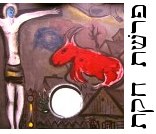
[ The following entry concerns our Torah reading for this week, parashat Chukat... ]
06.17.18 (Tammuz 4, 5778) Our Torah portion this week (i.e., parashat Chukat) begins, zot chukat ha-Torah (זאת חֻקַּת הַתּוֹרָה), "this is the decree of Torah" (Num. 19:2). The language here is both striking and unique, suggesting that what follows, namely, the ritual of the parah adumah or "red heifer," is nothing less than "the seminal decree" of the entire Torah... If we think about the meaning of the mysterious decree of the red heifer, however, we will realize that its ashes were used to create the "waters of separation" (i.e., mei niddah: מֵי נִדָּה) to cleanse people from contact with death (i.e., separation). To fulfill God's vital decree, however, required sacrificial love, since the priest who offered this service would become defiled (separated) for the sake of the healing of others... The Hebrew word for love is ahavah (אַהֲבָה), from a root verb (יָהַב) that means "to give." Love means giving of yourself to benefit another person (John 15:13). The central decree of Torah, then, beyond our ability to rationally understand, is that God's love is so great that it is willing to become dust and ashes on our behalf so that we might find blessing and life. The traditional Jewish interpretation of the meaning of the Red Heifer is a shadow of the Substance in Messiah:
The mitzvah of parah adamah (i.e., the red heifer) represents the suspension of logic in deference to the Divine Will. This attitude is not restricted to this mitzvah. Scripture introduces the mitzvah of the parah adamah with the words "this is the law of the Torah." Surrendering one's own reasoning and accepting the superior reasoning of Hashem is the law of the entire Torah... To the extent that we let go of our own will, we can understand the Divine will. Our ancestors at Sinai understood this ideal when they proclaimed, "we will do and then we will understand." Torah is not beyond our understanding, but we must be willing to make the sacrifices that true Torah understanding demands. - Living Each Day, Rabbi Abraham Twerski
Yeshua willingly became unclean on our behalf - through contact with our sin and death - so that we could become clean (Isa. 53:4, 2 Cor. 5:21, Gal. 3:3, Eph. 5:2, Titus 2:14). The pure became impure through His sacrificial offering. Because of Him, we have been cleansed from our sins "by a better sprinkling" than that which the Tabernacle of Moses could afford (Matt. 26:28, Heb. 9:14, 12:24, Eph. 1:7, 1 Pet. 1:2,18-19, Rom. 5:9; Col. 1:14, 1 John 1:7, etc.).
New Torah Audio Broadcast...
I also finished the "Shavuah Tov" audio broadcast for parashat Chukat for those of you who are studying the weekly Torah portion. In addition to discussing the content of the Torah portion - and particularly the significance of the mysterious Red Heifer (פרה אדומה) sacrifice - this broadcast also provides detailed discussion about the mitzvot (commandments) of the written Torah, including the subcategories of chukkim (decrees), mishpatim (rules or judgments), eidot (testimonials, holidays) with a discussion of the oral tradition's corresponding categories of halakhah (oral law) and its subcategories of gezeirot ("fences"), takkanot (case laws), and minhagim (customs). Throughout special attention is given to how Yeshua the Messiah is the Substance and Inner Meaning of all true Torah, and how sacrificial love is the idea of the Red Heifer itself. I hope you will find it helpful, friends.
In connection with our Torah reading for this week, note that the Hebrew word "chok" means a "divine decree," related to a verb meaning "to engrave" (חָקַק). The sages say that the word is directed to a desire to do God's will that is "engraved" upon the heart rather than simply understood with the intellect (2 Cor. 3:3). Indeed the very first time "chok" (חוֹק) appears in the Torah concerns Abraham's obedience of faith as demonstrated by the sacrifice of his beloved son (Gen. 26:5), and the second time concerns the sacrifice of the Passover Lamb of God: "This day shall be for you a memorial day, and you shall keep it as a feast to the LORD; throughout your generations, as an eternal decree (חֻקַּת עוֹלָם), you shall keep it as a feast (Exod. 12:12-13). Because both the Akedah and the sacrifice of the Passover lamb reveal God's yeshuah, his salvation, we are to engrave the significance of our deliverance by the Lamb of God within our hearts forever... Amen, just as God Himself has so engraved us upon his own heart, it is written, "behold, I have engraved you on the palms of my hands" (הֵן עַל־כַּפַּיִם חַקּתִיךְ) - Isa. 49:16. Shalom chaverim.
Postmodern Religiosity...

[ I wrote this over a decade ago sensing the accelerated nihilism of post modern culture... ]
06.18.18 (Tammuz 5, 5778) Religious sentiment is very often driven by the need to justify one's existence in the universe. After all, the universe itself appears as a brute fact, a seemingly radical contingency. It's just "there," this unapologetic looming monstrosity in which we "live and move and have our being." We see the innumerable stars above us; we experience the sweep of the ocean's expanse; we encounter the "numinous" wonder that accompanies the accidental, the non-necessary, the sheer gratuity of existence itself.
This world. We find ourselves embedded within it, victims of our genetics, collaborators of our own social/economic history, and generally subject to the affairs of the technocratic and political world around us. It is a given. It is immense.
"Why is there something rather than nothing?" asked Martin Heidegger, which is perhaps one of the most fundamental questions we can ask ourselves. After all, unless we are prepared to abandon ourselves to unabashed irrationalism (sadly, many of us do), our sanity compels us seek a rational account of the origin of the universe itself... Everyone is a philosopher of sorts; the only difference is that some are clear in their thinking whereas others are muddled...
Some people grow cynical of the haunting questions that beset life in this world and devise faux attitudes of superiority regarding the "stories we tell ourselves." These sorts of "intellectuals" flatter themselves by believing they are able to transcend the overarching questions that arise in response to the "is-ness" of life. Jaded, tired, and yet magically exempted from the frailties that beset us all, they tell us that they are privy to the "inner working" of narrative. Some of these self-styled "chosen" ones will even pretend to be able to see beyond the pathetic periphery of our normal lives to foretell us our future. Sadly enough, their future is entirely bereft of any abiding hope.
Such intellectuals of today (for example, Foucault, Baudrillard, Lyotard, Derrida, Rorty, etc.) are really anti-intellectuals, absurdists, akeptical clowns.... Like charismatic churches steeped in the (unconscious) despair of postmodern thinking, they speak "glossolalia" that only few will be attuned. Despairing of reason and the ability to think clearly about life, these "anti-thinkers" and self-styled anarchists of the hour, have chosen to opt-out of the game, gaining precious little solace by their shared pretense. They are condemned to themselves and, unless they repent, will inherit their own empty souls for eternity.
Unlike those who have abandoned themselves to despair, the religious sentiment seeks some form of self-justification in the world. Rituals, mummeries, chants, formulas, etc., are all meant to put a facade on the moral reach within each soul. For the religionist, the law is not only prescriptive, but descriptive. There are "insiders" and "outsiders." There are those who are "righteous" and those who are not.
Perhaps this explains something of the scandal of the gospel. "Those who are well have no need of a physician, but those who are sick. I came not to call the righteous, but sinners" (Mark 2:17). Yeshua was given the epithet "the friend of sinners" by his enemies -- which only proves Yeshua's character. The soferim (scribes) and the p'rushim (pharisees) were consistently among Yeshua's most ardent opponents. It was bad enough to suggest that their doctoring was suspect ("you can't give away what you don't have"), but it was even more of an affront to suggest that they themselves were spiritual sick...
Look, anyone who believes he or she has the "answer," who is healthy, who "has it together" or is otherwise smug or complacent regarding their inward condition will find themseves in opposition to the truth of Messiah. As Paul said it, "if anyone thinks he is something, when he is nothing, he deceives himself" (Gal 6:3).
Human pride must come to a catastrophic end. God is patient, but the hands of the clock are always moving... You are now one moment closer to the day of your death.
There is the cross of Yeshua which provides both the verdict and the deliverance, or there is the end of futile imagination - that parasite that feeds on the true language of hope and arrogates it for itself. You can't have it both ways.
The Gift of Salvation...

06.15.18 (Tammuz 2, 5778) We cannot "manufacture" salvation since it is entirely a gift from heaven, a revelation of life from above, and our only duty is to receive the blessing by the agency of divinely enabled faith (Eph. 2:8-10). Such faith is not the soul's grasping for God as much as it is God's grasping of the soul, taking it captive, leading it away from slavery to the world into the stillness of the desert. Yeshua plainly said that no one is able to come (οὐδεὶς δύναται ἐλθεῖν) to him for life unless God Himself "drags him" (John 6:44). The flesh is scandalized by this, of course, since the ego plays no part. Eternal life is found in the righteousness of Yeshua, and self-denial means to quit thinking about yourself (from α-, "not," + ῥέω, "to speak") by accepting what he has done for you. We have been (already) crucified with Messiah (the verb συνεσταύρωμαι is a perfect passive form), and just as we are identified with him in his death, so we are identified with him in his resurrected life. This is a matter of faith, trusting that God's love for your soul overcomes your radical inability to save yourself. God's mercy alone is your justification.... There is no faith from above apart from death to this world, however, and therefore the old nature must die, the world turned to dust, and everything reborn by the power of God. In a very real sense faith evidences the Presence of God, for Yeshua is the life of faith within us - he is the Source, Sustenance, and End of our heart's passion and great need. "The one that does truth comes to the light, that his deeds may be manifest that they come by the power of God" (John 3:21). Amen.
יְהוָה תִּשְׁפּת שָׁלוֹם לָנוּ
כִּי גַּם כָּל־מַעֲשֵׂינוּ פָּעַלְתָּ לָּנוּ
Adonai · tishpot · shalom · la·nu
ki · gam · kol · ma'a·sei·nu · pa·a·lta · la·nu

"O LORD, you will ordain peace for us,
for you have indeed done for us all our works."

Hebrew Scripture Study Card
The first duty of the heart is to believe in the miracle of God's love for your soul. Surrender of the heart is deeper than outward obedience, since it is possible to obey God for the wrong reasons. Our motivation must be grounded in God's love first of all (1 John 4:19). This is what it means to "die to yourself" or to be "crucified" with Messiah: you let go; you relinquish control; you trust God to accept you, sustain you, and bless you -- even in your weakest and worst moments. That is the nature of trusting in God's love for you. Shabbat Shalom!
Spirit and Truth...

06.15.18 (Tammuz 2, 5778) In matters of the Spirit, the category of "the interesting" is of little value, for the kingdom of God is a matter of power and transformation more than it is of human wisdom and words (1 Cor. 2:4; 4:20). Theological talk is not to be confused with the Divine Presence and the miracle of God's touch.... Not that doctrinal truth is unimportant or should be avoided, of course, but we must be careful not to regard it as an end in itself. The head and the heart must work together. While emunah (i.e., faith) may be somewhat "conceptual" or "theoretical," bittachon (i.e., trust) is the practice of emunah into everyday life. It is "where we live," in the everyday world of temptation, struggles, heartache, and hope. Sometimes "intellectual" people need to make a radical break from the paradigms they have relied on to understand true spirituality. For example, the "problem of evil" can be regarded as an "academic question" until someone experiences great personal suffering... Indeed, the "head" can actually become a "defense" against the duty of heart to sympathize with others, to share in the pain and sorrow that is a ubiquitous aspect of life in this fallen world. It is one thing to think that you love other people, but it's quite another to actually do so, "down in the trenches," so to speak... It is all too easy to become self-deceived (Gal. 6:3). As the Apostle John admonished those who claim to be followers of Messiah: "Little children, let us not love in word or talk but in deed and in truth" (1 John 3:17-18).
Thomas Aquinas' most significant work was his Summa theologiae or 'Summary of Theology,' a massive book that attempted to "systematize" all of Christian theology. He worked on it for many years, but when he was nearly finished he underwent a spiritual experience that, as he himself explained, made everything he had written "seem like straw." He thereafter gave up writing about "theology" after he encountered the Reality itself. Aquinas apparently moved from the realm of theoretical emunah to the realm of heartfelt bittachon. Similarly, toward the end of his life and career someone asked the prolific theologian Karl Barth if he could sum up all that he had learned and written. Barth thought a bit and replied, "Jesus loves me, this I know, for the Bible tells me so."
The Scriptures are "propositional" in their truth claims and therefore faith must be expressed in terms of emunah (i.e., as "theology"). However, the content of faith is not a static creed but calls for personal trust (bittachon) in the Living God who makes promises to those in existential need... All of this needs to be put in balance. Emunah must logically come first in the process, since we must first know about the true God before we can put our trust in Him... We must understand that "there is no other Name" for salvation given to us (Acts 4:12). After this, we begin learning to personally trust God in our daily lives. Yeshua gave us the proper order, "If you know these things, blessed are you if you do them" (John 13:17).
For more on this see: "Emunah and Bittachon: Further thoughts on parashat Shelach."
Torah of Groaning...

06.15.18 (Tammuz 2, 5778) As believers in the LORD we must learn to see beyond the temporal to behold the eternal; we must look past the shadows to see the substance. In a sense we have to close our eyes and walk in the darkness of faith to see the supernal light which transcends the atmosphere of this world (2 Cor. 5:7). Faith separates us from the visible and temporal realm (i.e., chayei sha'ah: חיי שעה) before the invisible and eternal realm (i.e., chayei olam: חַיֵּי עוֹלָם); it hears (shema) the "yes" of the LORD in the midst of worldly dissipation and despair. Faith is the heartache, the groaning, and the yearning for undying love. "Whom have I in heaven but you? And there is nothing on earth that I desire besides you. My flesh and my heart may be consumed, but God is the strength of my heart and my portion forever" (Psalm 73:25-26). This world appears to the eye of faith a strange place, and here we are no more than sojourners as we look for our heavenly habitation whose builder and maker is God (Heb. 11:10; John 14:1-3). Our hearts yearn for the unseen good, healing beyond death to life, the realm of promise and blessing and unending grace.
מִי־לִי בַשָּׁמָיִם
וְעִמְּךָ לא־חָפַצְתִּי בָאָרֶץ
כָּלָה שְׁאֵרִי וּלְבָבִי
צוּר־לְבָבִי וְחֶלְקִי אֱלהִים לְעוֹלָם
mi-li · va·sha·ma·yim · ve·im·me·kha · lo-cha·fatz·ti · va·a·retz
kal·lah · she·ei·ri · u·le·va·vi · tzur-le·va·vi · ve·chel·ki · E·lo·him · le·o·lam

"Whom have I in heaven but you?
And there is nothing on earth that I desire besides you.
My flesh and my heart may fail,
but God is the strength of my heart and my portion forever."
(Psalm 73:25-26)

Hebrew Study Card
The Torah begins: "In the beginning (בְּרֵאשִׁית) God created the heavens and the earth, and the earth was "tohu va'vohu v'choshekh" (תהוּ וָבהוּ וְחשֶׁךְ) - confusion and emptiness and darkness - which the sages interpret to mean that when we truly understand that God created the heavens and the earth, we will realize our earthy desires to be barren, empty and unreal. In their despair, Plato and the early Greek philosophers sought "timeless universals" which they believed disclosed the reality of an "upper world," a heavenly realm of unchanging goodness, beauty, and truth. The world we experience with our senses is a shadowy place of change and decay; but the real world, discerned by clear thinking, is a place of permanence, goodness and illumination. Likewise the righteous soul trusts that despite this fleeting world that turns to dust, there is an eternal realm, a place of abiding love, and a heavenly home. "For here we have no lasting city, but we seek the city that is to come" (Heb. 13:14). Therefore "we look not to the things that are seen but to the things that are unseen; for the things that are seen are transient (πρόσκαιρος), but the things that are unseen are eternal. For we know that if the tent that is our earthly home is destroyed, we have a building from God, a house not made with hands, eternal in the heavens" (2 Cor. 4:18-5:1). In this world we suffer exile, groaning to be with our Savior, the Source of all blessing: "I say to the LORD, "You are my Lord; I have no good apart from you" (Psalm 16:2).
Faith (i.e., emunah) is a "double movement" of the heart. It both "sees what is invisible" (2 Cor. 4:18) and understands (i.e., accepts) that the "present form of this world is passing away" (1 Cor. 7:31). Faith rests in God's providential hand over the chaos and flux of creation. The eye of faith beholds the Presence of God and His reign over all the mundane affairs of this world. Indeed, it is only by fixing our hope upon the eternal that we are enabled to rightly apprehend the nature of the temporal world itself. In fact, the word emunah (אֱמוּנָה) shares the same root as the Hebrew word for truth (אֱמֶת). In that sense, "seeing what is invisible" (τὰ μὴ βλεπόμενα) is a more fundamental type of "seeing," since the truth of hope ultimately interprets all other ways of seeing...
Discerning False Torah Teachers...

06.14.18 (Tammuz 1, 5778) Recently I was asked what I thought of those Jewish rabbis who deny that Yeshua the Messiah could have died for our sins because: 1) the Torah forbade human sacrifice, and 2) God would never allow an innocent man to stand in the place of a guilty one. Let's take a minute to think this through...
In response, let me first state first that when such people refer to the "Torah" in this matter, they are actually referring to the subset of the Torah called Sefer Ha-Brit (סֵפֶר הַבְּרִית) that defined the various ethical, social, and ritual obligations given in the Sinai Covenant (Exod. 24:7-8) and not to the Torah as a whole... Indeed, claiming that the whole Torah may be reduced to the terms of the Sinai Covenant is an example of the logical "fallacy of composition," that is, inferring that something must be true of the whole from the fact that it is true of some part of the whole.... We must remember that the Torah is something more than the code of laws and ritual obligations expressed in the terms of the Sinai Covenant (בְּרִית סִינַי), since the Hebrew word Torah (תּוֹרָה) is a general term meaning "direction," "teaching," "will of God," and so on. As we shalll see, the whole "Torah of Moses" contains far more than the covenant made at Sinai, as important as that part is.
Indeed the Torah of Moses reveals that the very first "priest" (i.e., kohen: כּהֵן) was neither a Jew nor a Levite nor a descendant of Aaron, but rather Someone who is said to have "neither beginning of days nor end of life" but is made like (ἀφωμοιωμένος) the Son of God, a priest continually (Heb. 7:3). This priest, of course, was Malki-Tzedek (מַלְכִּי־צֶדֶק), the King of Salem (מֶלֶךְ שָׁלֵם) to whom Abraham offered tithes after his victory over the kings (Gen. 14:18). The author of the Book of Hebrews makes the point that the priesthood of Malki-Tzedek is greater than the Levitical priesthood and is therefore superior to the rites and services of the Tabernacle (Heb. 7:9-11). It was to Malki-Tzedek that Abram (and by extension, the Levitical system instituted by his descendant Moses) gave tithes and homage -- and rightly so, since Yeshua is the great High Priest of the better covenant based on better promises (Heb. 8:6). Indeed, Yeshua is Himself the Promised Seed of Abraham who saves the world from the kelalah (curse) caused by Adam's transgression (Gen. 3:15). It is profoundly prophetic how Abraham was met by the Coming One as the Priest of the Most High God in the City of Zion, and how he gave him the tokens of bread and wine - the very commemorative emblems Yeshua gave to His disciples as a witness of His mediation for their sins (1 Cor. 11:23-26). It is also highly prophetic that Abraham himself was commanded by the LORD to offer human sacrifice when he bound his "only begotten son" Isaac upon the altar at Moriah. Many midrashim state that Isaac actually was killed but came back to life, and that agrees with the Book of Hebrews description that Abraham expected the resurrection of his son (Heb. 11:17-19). It is fallacious then, to claim that the Torah categorically forbade such a sacrifice. On the contrary, it was proclaimed to Adam and Eve, prefigured in the Akedah, and later spoken about directly by the Hebrew prophets, including David. "Then he [Messiah] said, 'Behold, I have come to do your will, O God, as it is written of me in the scroll of the book'. I delight to do your will, O my God; your law is within my heart" (Heb. 10:7; Psalm 40:8). As the prophet Isaiah also attested:
"He is despised and rejected of men, a man of pains (אִישׁ מַכְאבוֹת) and acquainted with sickness (וִידוּעַ חלִי), and we hid as it were our faces from him. He was despised and we esteemed him not. Surely he has carried our sicknesses (חֳלָיֵנוּ) and borne our pains (מַכְאבֵינוּ), yet we esteemed him as plagued (נָגַע), smitten of God (מֻכֵּה אֱלהִים) and oppressed. But he was pierced (מְחלָל) for our transgressions (פְּשָׁעֵנוּ), he was crushed for our iniquities (עֲוֹנתֵינוּ): the discipline for our peace was upon him (מוּסַר שְׁלוֹמֵנוּ עָלָיו); and in his blows we are healed. All we like sheep have gone astray; we have turned every one to his own way, but the LORD has attacked in him (הִפְגִּיעַ בּוֹ) the iniquity of us all" (Isa. 53:3-6).
The LORD has "attacked in him (הִפְגִּיעַ בּוֹ) the iniquity of us all..." Through the substitutionary sacrifice of the righteous Suffering Servant, Yeshua, we are both forgiven and made free from the power of sin and death. Because of Him we are no longer "lepers" or outcasts from the community of God but are made clean through His loving touch.
בְּדַעְתּוֹ יַצְדִּיק צַדִּיק עַבְדִּי לָרַבִּים
וַעֲוֹנתָם הוּא יִסְבּל
be·da·to · yatz·dik · tzad·dik · av·di · la·ra·bim
va·a·vo·no·tam · hu · yis·bol

"By his knowledge shall the righteous one, my servant,
make many righteous, and he shall bear their iniquities"
(Isa. 53:11)
The priesthood of Yeshua is said to be after the "order of Malki-Tzedek," based on a direct oath from God, that predates the operation of the Levitical priesthood (for more information about the role of Yeshua as our High Priest, see the article "Yom Kippur and the Gospel"). This is not unlike the King/Priest office that Moses held when he commanded the sacrifice of the Passover lambs during the Exodus. The korban pesach (sacrifice of Passover) was not originally instituted through the Levitical priesthood (i.e., the Mishkan), but rather predated the giving of the law to the priests. It is no coincidence that Yeshua explicitly referred to this (pre-Levitical priesthood) event to speak of His role as Seh Elohim, the Lamb of God who takes away the sins of the world (John 3:1-12).
Indeed, the Levitical priesthood "made nothing perfect" and therefore a "new priesthood" was required to finally reconcile us back to God (Heb. 7:19). "For when there is a change (μετατιθεμένης) in the priesthood, there is necessarily a change (μετάθεσις) in the law as well" (Heb. 7:12). The word translated "change" here comes from the verb μετατίθημι (from meta, "after" + tithemi, to "set") which would be better translated as "transposed." The idea is the priesthood reverted back to the original priesthood of Zion and therefore required a corresponding "transfer" of authority (μετάθεσις) to the original kingship as well (Heb. 7:12). Yeshua is our great Kohen Gadol (High Priest) after the order of Malki-Tzedek (Heb. 5:10, 6:20; 7:1-28), just as He is our King and the final authority of the Torah. Those who follow Him are called to be mamlekhet kohanim v'goy kadosh, "a kingdom of priests and a holy nation" forever (Exod. 19:6, 1 Pet. 2:9, Rev. 1:6, 5:10). Followers of Yeshua have an altar "from which those who serve in the Tabernacle are not permitted to eat" (Heb. 13:10).
In the older covenant, the role of the priest was primarily to help someone offer sacrifice, or present "korban" (קָרְבָּן) to God. This Hebrew word comes from a root (קרב) that means to "come close," specifically, to draw near to God. The offering was intended to bring someone who was far away near to God once again. In other words, the primary function of a priest was to help "mediate" the presence of God by means of vicarious sacrifice. This was the "korban" principle of "life-for-life" that implied hearing a confession of guilt and pronouncing forgiveness. The ENTIRE sacrificial system of the Torah (Mishkan/Temple) was predicated exclusively upon this. Only those who radically reinterpret the Torah and disregard over 40% of the mitzvot could claim that ritual sacrifice -- by the blood of an innocent victim -- is not expressly taught in the Torah. The life of the flesh is in the blood -- given to make "atonement" upon the altar (Lev. 17:11). The entire system was set up to "point to" the coming sacrifice of the Messiah Himself of whom the prophets foretold (Isa. 53, Psalm 22, Zech. 12:10, etc.).
Under the terms of the Sinai covenant, the kohen served as a facilitator, a helper, a comforter for those who wanted to draw near the LORD. The offering of a sacrifice served as a "symbol and expression of man's desire to purify himself and become reconciled to God" (Leibowitz, Vayikra). A related function of the priest was to serve as a healer, or someone who would pronounce the unclean as "clean." The metzora ("leper") first needed to be covered with his condition before he could be pronounced clean. This was metaphorical of the sinner's complete identification with his sin. The pronouncement of being "clean" meant restoration to the community and renewed fellowship. In each of these cases we find that priesthood of Yeshua is a greater than all the sacrifices made at the Temple. Indeed, He is greater than the Temple itself, which was merely a "shadow" of His Reality and Substance (Matt. 12:6; Heb. 10:1).
When the Second Temple was destroyed in fulfillment of Yeshua's prophecy (Mark 13:1-2, Luke 19:44), "Judaism without a Temple" was born, and that meant (among other things), that the role of the sage replaced that of the priest. Indeed, despite the (suppoed) Council of Yavneh and its purported legacy (i.e., Mishnah/Talmud), there simply is no Torah-based Judaism apart from the Holy Temple. Over 40% (247) of the 613 mitzvot (Torah commandments) concern the ceremonial laws of the Mishkan (Tabernacle). The Book of Leviticus is the central book of the Torah, and blood atonement by an innocent, sacrificial victim is at the heart of the law given to the priests of Israel.
Finally it should be noted that the proclamation of the Cross of Yeshua as the sole means of atonement with God is inherently offensive to the idea of "meritocracy" taught in traditional Judaism (and in other religions). Faith in Yeshua's work and human merit are antithetical ideas, so the underlying issue has to do with the question about how a person obtains righteousness before the LORD God of Israel... Is it through completely trusting in God's forgiveness and salvation given in the Messiah, or is it through performing enough mitzvot (good deeds) and hoping for the best? The symbol of faith for followers of Yeshua is the altar of the cross, not the scales of judgment....
Pursuing Inner Peace (רדיפת שלום)

06.14.18 (Tammuz 1, 5778) The Hebrew word for peace is shalom (שׁלוֹם), a word that means "wholeness," "completeness," "well-being," and "healing" -- not merely the absence of strife. People often fight with others because they are not made whole within themselves. Just as we cannot really love others until we first learn to love ourselves, so we cannot have peace with others until we first find our own inner healing and peace. Often this means learning to forgive both ourselves and others (including God) so that we can let go of whatever troubles our heart. As we accept ourselves and let go of our fear, we learn to accept others and give up the need to defend ourselves. As Yeshua said, "Blessed (happy) are those who love peace - for they shall be called the children of God" (Matt. 5:9).
אַשְׁרֵי עשֵׂי שָׁלוֹם
כִּי בְּנֵי־אֱלהִים יִקָּרְאוּ
ash·rei · o·sei · sha·lom
ki · be·nei · E·lo·him · yi·ka·re·u

"Blessed are those who love peace,
for they shall be called the children of God."
(Matt. 5:9)

In most English translations we read, "Blessed are the peacemakers, for they shall be called the children of God." Note, however, that the Greek word translated as "peacemakers" (εἰρηνοποιοί) can also mean "those who love peace," that is, those who long for peace and pursue it (see Psalm 34:14). In Jewish ethical teaching, seeking peace is called redifat shalom (רְדִיפַת שָׁלוֹם) and is considered a primary heart quality. Rabbi Hillel is attributed as saying, "Be of the disciples of Aaron, loving peace and pursuing peace" (Pirke Avot 1:2). Before we can hope to make peace among others, however, we must first know inner peace. If we threaten this peace, we rise up against God, and thereby undermine his will in our lives. Those who love peace will be called the children of God.
Peace is the foundation of God's great work of deliverance in our lives. Yeshua is called Sar Shalom (שַׂר־שָׁלוֹם), the "Prince of Peace" (Isa. 9:6), since salvation brings reconciliation (i.e., peace) between God and man (Rom. 5:1) and sets us free from the fear of condemnation. When we walk in the peace of God (שְׁלוֹם הָאֱלהִים) that "surpasses all our understanding," we are empowered to be a blessing to others in your life. "The fruit of righteousness is sown in peace by those who make peace" (James 3:18).
We understand the Torah commandment, "Thou shalt not steal" (לא תִּגְנב) to imply more than being forbidden to steal from others, but also to include the prohibition against stealing from ourselves by failing to practice inner honesty. When we lie to ourselves, we "steal" from the truth, we rationalize what is unjust, and we thereby rob from ourselves the great blessing of inner peace. Indeed, the traditional sages say that every sin essentially constitutes theft from God. For instance, in his discussion of teshuvah (repentance), Maimonides notes that confession of sin is connected with theft (Num. 5:7). Rabbi Yitzchak of Gur asks, "Inasmuch as there are 365 prohibitions in Torah, why does Torah choose to specify the need to confess sin in regard to theft?" He goes on to answer by explaining that if someone borrows something for a specific use, he is not permitted to use it for any other purpose other than that specified, lest he abuse the privilege and "steal the use" of the item. Likewise, God lends the soul the ability to speak, hear, see, and so on, for the sake of living a godly life. If we abuse these things, for example, by using our lips and tongue to speak evil about another, we are using our faculties for a purpose other than God intended, and that constitutes theft. Therefore every sin is a form of theft, an act of "breaking faith with the LORD," and that is why Torah mentions confession of sin in connection with it.
The Month of Tammuz (חודש תמוז)

06.14.18 (Tammuz 1, 5778) On the Biblical calendar the fourth month of the year (counting from Nisan) is called Tammuz (תַּמּוּז). The name "Tammuz" is most likely of Sumerian origin, and some scholars identify it as the name of the Sumerian sun god (Shamash), a mythical power that represented the seasonal life/death/rebirth cycle (i.e., samsara). The idolatry of Tammuz was something God condemned (Ezek. 8:14). Nevertheless, despite repeated warnings from the prophets to renounce such idolatry, the Israelites refused to do teshuvah, and the destruction of the Holy Temple was therefore decreed. Indeed, the Fast of the 17th of Tammuz marks the start of the "Three Weeks of Sorrow," a 21 day period of national mourning for the destruction of the Temple that is completed on Tishah B'Av.
Loving Torah (אהבת התורה)

06.14.18 (Tammuz 1, 5778) Surely followers of Yeshua the Messiah should love and study the Torah, esteeming it as a great treasure. After all, Yeshua was the Angel of the LORD (מַלְאַךְ יהוה) who spoke at Sinai when the Torah was given to Israel (Exod. 3:2, Deut. 4:12), and he is the same "yesterday, today, and forever" (Heb. 13:8). During his earthly ministry, Yeshua studied Torah and clearly taught us to keep the ways of the LORD (Luke 4:16, Matt. 7:12). He repeatedly affirmed the central teaching of the Torah – the Shema –putting the duty to love God above all else (Deut. 6:4-6; Mark 12:29). Indeed, the "New Covenant" itself promises that the Torah would be written "upon our hearts" (Jer. 31:31-33, cp. Matt. 26:28) and is inscrutable apart from it – just as Yeshua himself clearly taught (Luke 24:27; see also: Matt. 5:17, Rom. 15:4, 1 Cor. 10:11, 2 Tim. 3:14-17, etc.).
The Breath of God (נשימת יהוה)
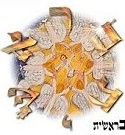
06.13.18 (Sivan 30. 5778) A verse from this week's Torah portion (i.e., Korach) reveals another great Name of God: Elohei ha-ruchot lekhol basar (אֱלהֵי הָרוּחת לְכָל־בָּשָׂר), which can be translated "the God of the breath of all flesh" (Num. 16:22). The LORD is the Source of your breath, the One who exhales to you nishmat chayim (נִשְׁמַת חַיִּים), the "breath of life" that enables you to live (Job 12:10). The sages use the analogy of a glassblower who creates a glass vessel. Just as the glassblower blows into a tube to form a vessel from molten glass, so the breath (i.e., neshamah: נְשָׁמָה) that comes from the LORD functions as spirit (i.e., ruach: רוּחַ) that forms and fills the human soul (i.e., nefesh: נֶפֶשׁ). Note that the Name YHVH (יהוה) first appears in this connection (Gen. 2:7), a Name that means "God is Present" (Exod. 3:14) and "God is Mercy" (Exod. 34:6-7). Note also that each letter of the Name YHVH represents a vowel sound (i.e., breath), suggesting that God's Spirit is as close as your very next breath. Like the wind that cannot be seen, so is the spirit the essential part of your identity. Yeshua breathed on his followers and said, "Receive the Holy Spirit" (John 20:22).
The special Name Elohei ha-ruchot lekhol basar appears only one other place in the Torah. After accepting the fact that he would soon die and therefore be unable to finally lead the people into the promised land, Moses prayed: "Let the LORD (יהוה), "the God of the spirits of all flesh" (אֱלהֵי הָרוּחת לְכָל־בָּשָׂר), appoint a man over the congregation who shall go out before them and come in before them, who shall lead them out and bring them in, that the congregation of the LORD may not be as sheep that have no shepherd." So the LORD said to Moses, "Take Joshua the son of Nun (יְהוֹשֻׁעַ בִּן־נוּן, lit. "son of life"), a man in whom is the Spirit (רוּח), and lay your hand on him" (Num. 27:16-18).
The Talmud notes that the word Nun (נוּן) means "fish," a symbol of activity and life. Joshua, the chosen one who succeeded Moses and led the people into the Promised Land, was the "Son of Life" - a clear picture of Yeshua our Messiah, the "spirit-filled good Shepherd" who would lay down His life for the sheep (John 10:11). The LORD is indeed the "God of the breath of all flesh." When Yeshua cried out, "It is finished" and breathed his last breath as He died for our sins upon the cross, the greatest exhalation of the Spirit occurred, the greatest sigh, the greatest utterance was ever declared. The sacrificial death of Yeshua for our deliverance was God's final word of love breathed out to those who are trusting in Him.
Echoes from the Future (הדים מן העתיד)
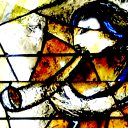
06.13.18 (Sivan 30. 5778) Yeshua forewarned of the alienation and moral sickness that would pervade mankind just before the time of his return: "Because lawlessness (i.e., ἀνομία, from -α ('not') + νομος, 'torah') will be increased," he said, "the love of many will grow cold (i.e., ψύχομαι, 'be extinguished')" (Matt. 24:12). Note the link between Torah and love: true love requires respect for God's authority, for without that the divine image is disfigured and desecrated. Likewise the Apostle Paul foresaw that the "End of Days" (אַחֲרִית הַיָּמִים) would be a time of peril (καιροὶ χαλεποί) because people would become increasingly narcissistic, self-absorbed, infatuated with their own sense of self-importance, abusive toward others, disrespectful to elders, ungrateful, heartless, unforgiving, without self-control, brutal, treacherous, and so on (2 Tim. 3:1-4). Therefore, in light of the spiritual war that rages all around us, it is vital that we remain firmly rooted in what is real by taking hold of our identity and provision as children of God. "God has not given us the spirit of fear, but of power (גְּבוּרָה / δύναμις) and of love (ἀγάπη), and of a "sound mind" (σωφρονισμός), i.e., a "delivered" mind -- centered and "healed" from inner chaos (2 Tim. 1:7). The name of the LORD (יהוה) means "Presence," and in Him "we live and move and have our being" (Acts 17:28). He is as close as our heart and our very breath (Rom. 10:8). We are not to be troubled like the world that lives in terror of man, nor are we to crave security from the vain devices of mere men. No - we must look to God Almighty, the Master of the Universe. He alone is our Refuge and Defense, the One who gives us steadfast love in the midst of these storms. "Let not your heart be troubled" - God is in control of the whirlwind, friends...
According to orthodox Jewish eschatological tradition, the period of time immediately before the Messiah's arrival is sometimes called ikvot meshicha (עִקְּבוֹת מְשִׁיחַ), the time when the "footsteps of the Messiah" can be heard. Some of the "signs" of this period include the rise of various false prophets, numerous wars and "rumors of wars" (including the rise of Magog: Iran), famines, earthquakes, worldwide apostasy from the faith, persecution, and a globalized sort of godlessness that is revealed in unbridled selfishness, greed, chutzpah (audacity), shamelessness, and a general lack of hakarat ha-tov (gratitude). The greatest sign, however, will be that Israel will exist once again as a sovereign nation, despite the prophesied exile among the nations (Deut. 4:27-31; Jer. 30:1-3). For more on this fascinating subect, see the article "Birthpangs of Messiah."
Beware False Prophets (נביאי שקר)

06.13.18 (Sivan 30. 5778) "Beware of false prophets," Yeshua warned, "who come to you in sheep's clothing (literally, "the skins of sheep," ἐν ἐνδύμασι προβάτων), but who inwardly are ravenous wolves. You will recognize them by their fruits" (Matt. 7:15; cp. 2 Pet. 2:1). However, because they come in disguise, pretending to be "children of light," we must be all the more vigilant. On the one hand, we must beware of those who "wrap themselves in a tallit" (legalists) and teach that we should come under the yoke of the law (Matt. 23:15), and on the other hand, we must beware those who deny or minimize words of the Torah, and who falsely claim that the way to heaven is "broad," and that we therefore have licence to walk after the desires of our own hearts (antinomianists). We must use discernment, chaverim. The LORD allows false teachers in our midst to test our hearts: "For there must be factions among you in order that those who are genuine among you may be recognized" (1 Cor. 11:19). Therefore we must "test the spirits" to see if they are "of God," that is, whether they focus on the righteousness of God given exclusively through Yeshua, the "narrow way that leads to life" - or whether they focus on something else. The Ruach HaKodesh always centers the heart on the glory of God revealed in Yeshua (John 16:14; 1 Cor. 2:2, etc.).
People sometimes argue about law vs. grace; faith vs. works, and so on. These are "antinomies" of reason; they serve as another test for you to surrender to the tension of unknowing, paradox, and therefore they will make you vulnerable to misunderstanding (and even slander) from others... False teachers like to appeal to what "makes sense" or that which flatters the ego (pride); false teaching often stresses one side of the paradox at the expense of the other... Hence we see legalism and libertinism in various churches.... Please understand that I am not anti-Torah and indeed I have written more about the value and meaning of Torah than any other Christian ministry of which I am aware. I use the word "Torah" correctly, however, understanding it to be in harmony with the idea of God's grace, and I do not make the common mistake of understanding it as "law." To the legalist I will stress grace, unconditional love, etc.; to the grace-based I will stress personal responsibility, the need to do works of righteousness, etc. The heart of the law is the law of the gospel; God is One and Torah is One. Do not confuse the idea of "brit" or covenant with the deeper idea of Torah, which refers to direction, vision, focus, kavanah, purpose, passion, and so on.
Making the Dead Alive (תְקוּמָה)

06.13.18 (Sivan 30. 5778) We must be careful not to confuse cause and effect in the realm of the spiritual. After the original transgression of Adam and Eve, death became the root problem of the human condition, so to speak, with indwelling sin as its fruit (i.e., the "works of the flesh"). It is this inherited "spiritual death" that causes sin. To focus on outward behavior without first of all dealing with the underlying problem of spiritual death is therefore a misstep. It is to clean the outside of the cup or to wash the outside of a tomb in a vain attempt to disguise the truth about our unclean and dead condition. The good news is not that God wants to make bad people good, but rather wants to make dead people alive... The cure for spiritual death is to be reborn and to partake of the resurrected life of Yeshua.
Following Yeshua is not a sort of "moral reformation" or self-improvement program to make us acceptable to God. Yeshua did not die on the cross so that we would become entangled in the old ways of being... No! He is Lord and Master and we find new life in His acts of deliverance done on our behalf and for our benefit. The temptation is always to go back to the law of sin and death (i.e., the principle of self-justification), but as Luther once said: "The sin underneath all our sins is the lie of the serpent that we cannot trust the love and grace of Christ and that we must take matters into our own hands."
"LORD, I need Thee every hour..." There never will be a time when we "get past" the need for God's grace given in Yeshua, since the only antidote to power of indwelling sin is the greater power of God's redeeming love within our hearts (1 John 3:8). The gospel is - not was - "the power of God for salvation (δύναμις θεοῦ ἐστιν εἰς σωτηρίαν) for everyone who believes" (Rom. 1:16); it is an ongoing source of power for our lives... Our identity is made secure in the finished work of the Messiah - we trust in His strength, not our own; it is "Messiah in you" that is the hope of glory (Col. 1:27). Just as we are given a new life entirely by means of God's grace, so we are also sanctified as we walk in that newness of life... "As you received Yeshua the Messiah the LORD, so walk in Him" (Col. 2:6). The focus is always on Yeshua and His righteousness and obedience... Every step of the way is a miracle and a wonder when we walk "in Messiah."
We walk "in Him," that is, in His strength, in His power, in His love... we don't walk "to" Him or attempt to climb the "stairway to heaven." Yeshua is the Way, the Truth, and the Life. He is the Bridge - sha'ar hashamayim (שַׁעַר הַשָּׁמָיִם) and the Divine Ladder upon whom the angels of God ascend and descend. We look to Him, not to ourselves for life. Because of the life of Yeshua within us, we are now able to bear fruit of the Holy Spirit as the Torah is written upon our hearts (Jer. 31:31). We are enabled to keep the Torah of Yeshua (תּוֹרָה יֵשׁוּעַ) because the life of Yeshua empowers us to do so...
Beware the "Seeming Way..."

06.12.18 (Sivan 29. 5778) "There is a way that seems right to a man, but its end is the way to death" (Prov. 14:12). Our postmodern culture celebrates "relativism," or the spurious notion that that there is no such thing as objectively knowable truth... Apart from the self-contradiction that arises by saying that it is (objectively) true that there is no objective truth, the unthinking acceptance of this sophistical perspective leads to mindlessness, the lack of creativity, moral stupidity, apathy, and delusional thinking. Popular culture inculcates and preaches there are no moral absolutes and therefore terms like "right" and "wrong," "just" and "unjust," "true" and "untrue" should (ahem) be translated as expressions of preference without any reference to moral categories or structures that extend beyond the individual (or sometimes collective) will. According to this backwards view, Mother Theresa was no better a person than was Adolf Hitler; and therefore genocide, slavery, murder, and so on, are "lifestyle choices" that express individual or collective preference, but nothing else. Indeed such a viewpoint claims there is no way to infer an "ought" from an "is" (no "prescription" from "description") and therefore assigning moral praise, blame or responsibility is ultimately meaningless.
Understand, then, that the uncritical acceptance of epistemological and moral relativism stifles the life of the mind by implying that there is no difference between truth and error, between good and evil, between beauty and ugliness, between logical and illogical thinking, and so on. However, since language and meaning are necessarily grounded in logic, naive relativism is ultimately unintelligible and incommunicable, since logic assumes that meaning and rules of inference serve as the conditions of any expression of thought. I share this to point out that the thinking of our culture is not based on careful reflection or reasoning but is essentially a matter of brute force, and therefore it is rightly to be regarded as irrationalism, an implied appeal to violence, and depraved thinking. Of course this sort of relativism is a very useful indoctrination technique regularly used by political agitators, the mass media, by government propagandists, con artists, and by all those who rely on dimwitted people to manipulate and control. Therefore the thoughtful person of truth, that is, the person of genuine moral conviction derived from intuitive axioms of reasoning, will always be regarded as an enemy to those who live and practice the lie.
יֵשׁ דֶּרֶךְ יָשָׁר לִפְנֵי־אִיש
וְאַחֲרִיתָהּ דַּרְכֵי־מָוֶת
yesh · de·rekh · ya·shar · lif·nei-ish
ve·a·char·i·tah · dar·khei-ma·vet

"There is a way that seems right to a man,
but its end is the way to death"
(Prov. 14:12)

Martin Buber once said, "What is accomplished through lies can assume the mask of truth; what is accomplished through violence can go in the guise of justice, and for a while the hoax may be successful. But soon people realize that lies are lies at bottom, that violence is violence - and that both lies and violence will suffer the destiny history has in store for all that is false." As Yeshua himself said, "For this purpose I was born and for this purpose I have come into the world -- to bear witness to the truth. Everyone who is of the truth listens to my voice" (John 18:37). "Blessed are those who wash their robes, so that they may have the right to the Tree of Life and that they may enter the city by the gates. Outside are all those who love and practice the lie..." (Rev. 22:14-15).
The Warning of Korah...
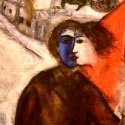
06.12.18 (Sivan 29. 5778) Our Torah portion this week (i.e., parashat Korach) centers on the rebellion of Korach, a man who questioned God's authority and arrogantly sought to "intrude" into the office of the priesthood. It is noteworthy that his rebellion is explicitly mentioned only once in the New Testament - in the Book of Jude - as an example of the fate that awaits those false teachers who likewise despise God's law. Unfortunately, Jude's warning is often neglected today, probably because people feel uncomfortable over the prospect of God's judgment. After all, in our "politically correct" age, people have been indoctrinated to regard "tolerance" as the greatest of virtues and "intolerance" (even of evil) as the greatest of vices.... Most unbelievers don't mind hearing the "good news" of God's love, but they take exception when they are confronted with their personal duty to live according to the moral truth revealed in the Torah. False teachers within the church are dangerous because they feed on this sense of discomfort and attempt to rationalize it away. Jude identifies them as spiritual impostors who "work from the inside" to confound or obscure the truth of God. Such charlatans may appear to be "true believers," but their hidden agenda is to sow confusion and sin among God's children. They are proverbial "wolves in sheep's clothing" (Matt. 7:15). Jude's warning is especially important for us to heed in this present hour, because in the time immediately preceding the coming of the Messiah, spiritual deception and unbridled godlessness will greatly increase (see 2 Tim. 3:1-5).
Note: For more on this very important subject, see "The Message of Jude."
Deliverance and Faith...
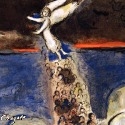
06.12.18 (Sivan 29. 5778) In my article on the message of Jude, I mentioned a fascinating verse that is worthy of sober meditation and contemplation, namely: "Now I want to remind you, although you once fully knew it, that Yeshua (Ἰησοῦς) saved the people out of the land of Egypt but afterward destroyed those who did not believe" (Jude 1:5, Greek text: Υπομνῆσαι δὲ ὑμᾶς βούλομαι, εἰδότας ὑμᾶς ἅπαξ πάντα ὅτι Ἰησοῦς λαὸν ἐκ γῆς Αἰγύπτου σώσας τὸ δεύτερον τοὺς μὴ πιστεύσαντας ἀπώλεσεν). Now I am aware that some translations substitute "the Lord" (ὁ κύριος) for Yeshua (Ἰησοῦς) in this verse, but the best evidence of the extant MSS of the ancient texts indicates that Ἰησοῦς, or "Jesus" (Yeshua) is the preferred reading. At any rate, regardless of such textual concerns, we assuredly know that Yeshua indeed is the LORD who led the people out of Egypt during the Exodus based on a multitude of other Scriptures and sound logical inferences, but I thought I would take a minute and point this great verse out to you. Consider that it was Yeshua who spoke from the midst of the fire in the Burning Bush, commissioning Moses to go to Pharaoh; it was Yeshua who instructed Moses to lift up his staff and bring forth the plagues; it was Yeshua who taught Moses the meaning of the sacrifice of the Passover Lamb of God; it was Yeshua who led the people out of Egypt into freedom; it was Yeshua who uttered the Ten Commandments to Israel at Sinai; it was Yeshua who gave Moses the vision of the Altar (Mishkan) and commanded the daily offering of the Lamb of God; it was Yeshua who revealed the inner meaning of the Name YHVH to Moses (after the Sin of the Golden Calf); and it was Yeshua who called for sacrificial blood to be sprinkled over the broken tablets upon the kapporet of the Ark of the Covenant, revealing the meaning of the Cross and how the sacrificial blood covered the transgressions of the people. Moreover, as our verse from Jude reveals, it was also Yeshua who punished those who refused to receive the blessing with exile from the promise.... In the case of Jude's warning, false teachers inevitably deny the authority and glory of Yeshua as God the Son, that is, God incarnated as the "Son of Man," the Second Adam, the Redeemer, Savior, and King over all, as he said: "For certain people have crept in unnoticed who long ago were designated for this condemnation, ungodly people, who pervert the grace of our God into a licence to sin and who deny our only Master, God, and Lord (τὸν μόνον δεσπότην θεὸν καὶ κύριον) Yeshua the Messiah" (Jude 1:4). Note here that the description of Yeshua as our Master, God, and LORD is the antecedent for the verse that states that though he saved the people out of Egypt, he destroyed those who refused to believe -- and that of course is a very sober warning for us all. Blessed is the LORD God of Israel our King and Savior. The LORD is the same yesterday, today, and forever -- and therefore let us cling to Him and take hold of his blessings...
Every Thought Captive...
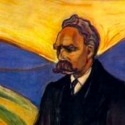
[ "For the weapons of our warfare are not of the flesh but have divine power to destroy strongholds. We destroy arguments and every lofty opinion raised against the knowledge of God, and take every thought captive to obey the Messiah" (2 Cor. 10:5). ]
06.11.18 (Sivan 28. 5778) Our postmodern age exhibits a devout faith in the values of "tolerance" and "open-mindedness," though the way these words are used barely conceals a cynical indifference and even hostility to the view that objective truth – that is, a metaphysical, moral and spiritual order to reality – is transcendentally knowable and logically necessary. Many intellectual poseurs of our time claim that all worldviews and religious perspectives "should be" (ahem) deconstructed, qualified, minimized, homogenized, and reduced to equal (in)significance; and, since there is no impartial way to arbitrate such pluralistic convictions about reality, all respective truth claims "should be" understood as relative, subjective, and a form of political exploitation or manipulation.
Of course this epistemologically skeptical view is "magically" immune from its own criticism, since to know that skepticism is true is to transcendentally claim to know something true about reality, and yet this reductio ad absurdum doesn't seem to bother the so-called "intellectuals" of our day. Indeed, postmodern thought often extols "tolerance" as the preeminent intellectual value, which essentially means it commends apathy and cowardice as the guiding intellectual virtues of thinking. The so-called "tolerant" person is functionally a person without conviction, that is, a coward who is more afraid of being wrong than risking commitment for his or her beliefs. It is intuitively obvious, however, that the human mind is "hard-wired" to make logical inferences and to draw conclusions, and the desire to "suspend" the use of reason (by absurdly arguing that reason itself is a tool of oppression) really amounts to opting out of serious thought altogether. Despite the squawking rhetoric and empty bluster, the postmodern "intellectual" is on the wrong side of truth and reality, just as the its parasitical use of words such as "justice," "human rights," "bias," "entitlement," and so on, tacitly appeal to transcendental moral categories that provide the semantic and logical ground for the idea of truth itself.
"Those who do not love truth excuse themselves on the grounds that it is disputed and that very many people deny it. Thus their error is solely due to the fact that they neither love truth nor charity, and so they have no excuse" (Pascal, Pensees). Many people today opt out of the mandate to search for (and to live by) the truth, because, they claim, not everybody agrees on what the truth is, and therefore they are "excused" from the duty... Such people want to be "innocent" of taking sides in the issue, pretending to be "neutral" parties in the debate, and thereby they suppress their judgment rather than risk a commitment. Of course this amounts to the decision not to decide and therefore expresses an evasion from moral and spiritual reality.
Deconstructing Nonsense...

06.11.18 (Sivan 28, 5778) It is written in our Scriptures: "The fool says in his heart, 'There is no God' (אָמַר נָבָל בְּלִבּוֹ אֵין אֱלהִים). Indeed Psalm 14 teaches us that the willful denial of reality is an affront to heaven, contempt shown for the gift of life, and sacrilege of all that is worthy. It is sheer folly to regard life apart from the fear of the LORD, for that is reishit chokhmah - the beginning of wisdom (Psalm 111:10). The existence of God is the First Principle of all sound reasoning regarding reality. The so-called "postmodern world" is notorious for failing to explain anything of substantive meaning. Everything is left unexplained; no narrative is permitted (except the narrative that there is no narrative, of course); no logical connections to a "real world" are sound; there is no "story" to our lives, and therefore postmodernism entirely misses the essential point of everything. King David asked, "Who shall abide before the Presence of the LORD?" and the Spirit replied: "the one who walks blamelessly and does what is right and speaks truth in his heart" (Psalm 15:2). It is the one who is honest – "the one who speaks truth within his heart" (דבֵר אֱמֶת בִּלְבָבוֹ) that dwells in the "tent of the LORD," for God is called the God of Truth (אֵל אֱמֶת), the Faithful God (אֵל אֱמוּנָה). In heaven there is only the language of truth, and truth is the language of heaven. The "pure in heart" – that is, those who accept the truth of their inner condition, who acknowledge their lost condition, mourning over their lives, and who humbly find themselves starving for God's deliverance – these are the ones who shall behold God (Matt. 5:2-6). Blaise Pascal once wrote: "I can feel nothing but compassion for those who sincerely lament their doubt, who regard it as the ultimate misfortune, and who, sparing no effort to escape from it, make their search their principal and most serious business. But as for those who spend their lives without a thought for this final end, I view differently. This negligence in the matter where they themselves, their eternity, their all are at stake, fills me more with irritation than pity: yea, it astounds and appalls me..." (Pascal: Pensees).
About Postmodern Christianity...
Postmodern Charismatic Christianity is a phenomena of despair. By "despair," however, I do not mean "gloom" or "dejection," but rather an absurdist anti-intellectualism that derived from the loss of hope regarding obtaining real knowledge about the world. In popular culture, we see that this despair arose just after WWI (in the USA, earlier in Europe), though its roots trace back to the anti-philosophy of the German philosopher Immanuel Kant (1784-1804).
Kant posited "limits" to the mind's ability to know reality by defining a chasm between appearance (phenomena) and reality (noumena). The realm of phenomena was open to inspection using the methods of reason, science, etc. The realm of the numinous, however, was only "managed" by positing transcendental "categories" to help lend order to the unknown. Perhaps unwittingly, Kant's doctrine opened the door to various forms of irrationalism, since all the meaningful aspects of life (human love, semantic meaning, hope in afterlife, freedom, the existence of God, etc.) were relegated to the murky world of the numinous, leaving us with only a world of "managed appearances" to traffic in as human beings in the world.
GW Hegel (1770-1831) took the next step and speculated wildly above Kant's uncrossable line. The phenomenal world (Zeitgeist) was "really" a manifestation of Absolute Spirit working its way out through "dialectic" in the space-time world. Later Karl Marx (1818-1883) rejected the idea of Spirit and substituted material forces (i.e., economics) as the engine that drove historical processes. Nietzsche and his odious spawn, Adolf Hitler soon became "true believers" of such irrationalism...
How does this relate to Charismatic Christianity, then? The division of rational and irrational modes of encountering reality opened the door for absurdist encounters with the spirit realm. Since God cannot be understood using the mindset of reason, He is known only through the experience of mystery. Faith is expressed by actually contemning rationality and embracing the ludicrous... I don't have time to develop this presently, but perhaps I will revisit this issue later. Suffice it to say that Charismatic Christianity is generally an aberration that is symptomatic of the despair of the "postmodern" age.
The Rebellion of Korah (פרשת קורח)
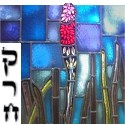
06.11.18 (Sivan 28, 5778) Last week's Torah portion (Shelach Lekha) told the tragic story about the "sin of the spies" and the divine decree that the generation rescued from Egypt was sentenced to die in the exile of the desert. In this week's portion (parashat Korach), the hard truth of their condition began to sink in, and the people bemoaned their fate and rebelled further by attempting to overthrow God's designated leadership and return to Egypt. This rebellion was instigated and organized by Moses' cousin Korach, who – along with a band of co-conspirators – was swiftly judged and put to death, thereby vindicating the Aaronic priesthood and Moses' leadership of Israel.
Korach was the cousin of Moses and a well-respected Kohathite who was honored to be one of the carriers of the Holy Ark. He was a wealthy man of influence - a nassi (prince) of the people. Despite all this privilege, however, Korach rationalized that he should be the head of the Kohathite clan (instead of his cousin Elzaphan), since he was the firstborn of Kohath's second son, whereas Elzaphan was not even a firstborn son. Indeed, because he felt slighted by Moses' choice, Korach went even further and brazenly questioned whether the office of the High Priest should not have been given to him – rather than to Aaron.
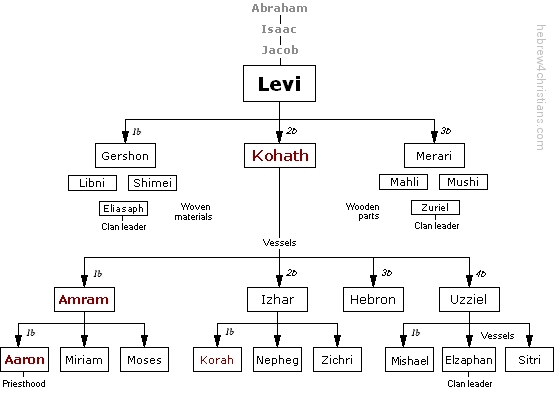 |
Korach's co-conspirators were two brothers named Dathan and Abiram from the tribe of Reuben, Israel's firstborn son. Together, they put together a force of 250 men to confront Moses and to challenge his exclusive claim to leadership: "You have gone too far! For all in the congregation are holy, every one of them, and the LORD is among them. Why then do you exalt yourselves above the assembly of the LORD?"
In response to their challenge, Moses proposed that Korach and his followers bring firepans to offer incense at the Tabernacle to determine whether they were indeed chosen to serve as priests. The following morning, when Korach and his 250 followers assembled at the gate of the Tabernacle to offer incense, God threatened to destroy them all instantly. Moses begged God not to destroy all the people, but only the rebels. He then warned the congregation to stand clear of the dwellings of Korach, Dathan, and Abiram. The earth then opened up and swallowed them alive, and a fire consumed the 250 men who illegitimately offered the incense...
Korach's rebellion introduced outright mutiny and chaos within the leadership of the camp that brought swift and terrible rebuke from the LORD. Nevertheless, the very next day the entire congregation of Israel audaciously began to accuse Moses and Aaron, saying: "You have killed the people of the Lord." When the people looked toward the Tabernacle, however, the Glory of the LORD appeared, where God descended to tell Moses and Aaron that he was going to destroy the Israelites for their treason. Despite Moses and Aaron's fervent intercession, however, a deadly plague broke out among the people. Moses then instructed Aaron to take his firepan with incense and to bring it in the midst of the congregation to make atonement for them. Aaron did so, "and he stood between the dead and the living; and the plague was stayed." The Torah tells us that 14,700 Israelites died because of the plague, not including the deaths of those involved in the rebellion of Korach.
As a final test to vindicate Aaron as God's chosen priest, each of the twelve tribal heads of Israel, as well as Aaron himself, were instructed to bring their staffs to Moses. Moses then inscribed their names on each staff and brought them into the sanctuary before the ark of the testimony. "And the staff of the man whom I choose shall sprout. Thus I will make to cease from me the grumblings of the people of Israel, which they grumble against you." The following day Moses went into the Tabernacle and "behold, the staff of Aaron for the house of Levi had sprouted and put forth buds and produced blossoms, and it bore ripe almonds." He then brought out all the staffs and gave them back to each of the tribal leaders. God then told Moses to return Aaron's staff to the Tabernacle as a testimony for generations to come.
Logic and Seeing...
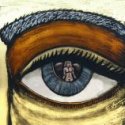
06.11.18 (Sivan 28, 5778) Our faith says human beings are created b'tzelem Elohim - in the image of God. "In the beginning was the Logos" (John 1:1). Logic itself is "hard-wired" into us and any attempt to deny its validity presupposes its existence. Logic also presupposes any form of experience, since we cannot even identify something without its categories at work. Similarly, the sense of value is hard-wired into us. We cannot know anything without valuing (and willing) knowledge itself, and therefore our sense of value (and goodness) precedes all experience. So both empirical and moral truth is inescapable for self-conscious individuals. Now since faith is always faith in something, it is evident that it points to something "outside" of itself, namely, to reality. In matters of fact (rather than tautological statements such as a=a), the "belief that p" is an existential statement that "p exists." A particular belief can be mistaken, of course, but if it is a true belief then (by definition) it must proximally correspond to reality. In other words, our beliefs (and the inferences made from our beliefs) are nothing less than confessions of faith concerning what is ultimately real.
The Purpose of Tzitzit...
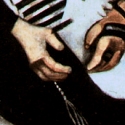
06.10.18 (Sivan 27, 5778) After the people rebelled by heeding the report of the spies and were forbidden to enter the Promised Land, the LORD commanded that tzitzit, or "tassels," were to be put on the "corners" (כנפים) of their garments to warn them of the danger of unbelief: "Speak to the people of Israel, and tell them to make tassels (צִיצִת) on the corners of their garments throughout their generations, and to put a cord of blue (תְּכֵלֶת) on the tassel of each corner. And it shall be a tassel for you to look at and remember all the commandments of the LORD, to do them, not to follow after your own heart and your own eyes, which you are inclined to whore after" (Num. 15:38-39). In other words, the tzitzit were intended to remind the people of the terrible sin of unbelief that prevented them from obtaining their inheritance. Note that there is Hebrew wordplay used in this passage of Torah, since the verb translated not to "follow after" your own heart and your own eyes (i.e., תּוּר) is the same verb used to describe "spying out" the land of Canaan (Num. 13:2).
 |
Note that donning tzitzit is traditionally performed daily (during morning prayers) by Orthodox Jews as a visual reminder of the duty to keep the commandments of God and to warn of the tragic consequences of unbelief. In a sense, tzitzit serve as a "confession" of weakness since they acknowledge we are prone to be carnally minded and people of little faith...
The Eyes of Science...

06.10.18 (Sivan 27, 5778) The knowledge of God is not like the knowledge obtained by laboratory science. Empirical data is based on the reliability of what is called "logical induction," that is, phenomenological impressions of repeatability, continuity, and perpetuity which assume that metaphysical cause and effect event/relationships hold in "space-time." However, the intellectual act of logical induction assumes several more basic things, for instance, the instinctive faith that the future will resemble the past; the unreflective assurance that sensory experience is reliable and that measurement is possible; the mystical expectation that mathematical concepts refer to (or correspond with) "external" reality; the metaphysical supposition that causal connections exist and are valid; the quasi-religious conviction that experiences (i.e., data) can be universalized and generalized into "laws," and so on. Moreover, scientific methodology further assumes certain "intellectual virtues" and non-empirical values, for instance, the assumption that truth is important; that insistence that data should be verifiable and not deliberately falsified (or politicized); the moral axiom that it is better to know than not to know, etc. Indeed science even expresses "artistic sentiment" by poetically arguing that some scientific theories (i.e., "narratives") or models ("metaphors") are more "coherent" or "elegant" than others, that symmetry and order are important to doing research, and so on. I say all this to demonstrate that science is a faith system that depends on logical, metaphysical, philosophical, spiritual, and axiological assumptions that are not derived from nor grounded in the practice of science itself... The foundations of science are based on concepts and ideas "pilfered" from the Torah and the truth of God. Far from discovering the means of doing science through the paradigm of the "scientific method" itself, understand then that the first principles of logic, the exercise of faith, and an objective sense of transcendental value are all presupposed in order to inductively identify and infer whatever is defined as "real." The knowledge of God, on the other hand, is based on moral intuition (conscience, a sense of justice, etc.), logical reflection (e.g., why there is something rather than nothing at all), mystical awareness and a sense of the numinous, direct revelation (i.e., spiritual encounter), the veridical experiences and testimonies of others, the perpetuity of the confession of believers, and so on. For those who have encountered the Divine Presence in Yeshua, the risen and ascended Savior, God further gives witness by means of "argumentum spiritus sancti," the testimony of the Holy Spirit, the inner revelation that is imparted to comfort and assure the heart of faith.
 |
Every belief system requires a choice, or the "will to believe," as William James put it, and that applies equally to the religion of science as it does to any other religious faith. In other words, how we see is a spiritual decision since it necessarily involves metaphysical presuppositions... The eyes see more from the heart than from the head. From our Torah portion for this week (i.e., Shelach Lekha) we read: "See the land, what it is ... whether it be good or bad ... and strengthen yourselves" (Num. 13:18-20). Here note that right seeing – even the negative aspects of the land such as the presence of "giants" – can only be achieved by the courage derived from faith. When you see things that appear bad, you are to "strengthen yourselves," a Hebrew verb (i.e., וְהִתְחַזַּקְתֶּם) that means to intently decide to see the good despite the present veil of appearances. When we encounter things that are bad, we must refuse to be overwhelmed by carnal reasoning and fear by looking beyond the moment to behold a promised good (2 Cor. 4:18).
Note: Science, when honestly done, is not bad, of course, and can be a blessing; but when science pretends to do "philosophy" (or worse, theology), incoherent thinking and fallacies inevitably follow. My experience has been that whenever scientists attempt to philosophize, they are overstepping their training and authority, so to speak, and it would be better for them to abide by the epistemological constraints imposed by the scientific method itself...
The Path of Life (אֹרַח חַיִּים)
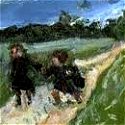
06.08.18 (Sivan 25, 5778) Spiritual regeneration or transformation isn't just leaving the sinful past behind you, but discovering the glory of true and infinite life that sustains all of reality... There is change of perspective, of no longer backing away from the hell you came out of by turning around to focus on heaven, your true spiritual home. We are called to pursue the goal of the upward call of God in Messiah (Phil. 3:14). If we walk in the light, the LORD will cause us to know "orach chayim," the path of life; we will find joy in the Divine Presence; and we will discover pleasures that endure forever:
תּוֹדִיעֵנִי ארַח חַיִּים
שׂבַע שְׂמָחוֹת אֶת־פָּנֶיךָ
נְעִמוֹת בִּימִינְךָ נֶצַח
to·di·ei·ni · o·rach · chai·yim
so·va' · se·ma·chot · et · pa·ne·kha
ne·i·mot · bi·min·kha · ne·tzach

"You will cause me to know the path of life;
in your presence there is fullness of joy;
at your right hand are pleasures forevermore."
(Psalm 16:11)

Download Study Card
Have you discovered the glory and wonder of God's love, despite the many sins and the shame of your life? Do you know "in your gut" that his love means no longer having to defend or explain yourself? God's love enables you to quit hiding what you really are from Him; you can give up the pretense of being something you're not. When you turn to the Lord in the transparency of your brokenness, weakness, and neediness, you will find Him there, accepting you for who you really are... The path of life is -- the path of life! Shabbat Shalom!!
Repentance and Courage (תשובה ואומץ)
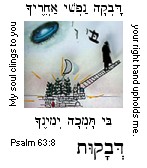
06.08.18 (Sivan 25, 5778) It is a truism of human nature that once we become accustomed to something, it's often very difficult to change our vision. We see what we want to see; we pretend to choose when we are chained to habit; we take ourselves hostage to the power of the lie. Most of us seem to instinctively resist change, even at the expense of our well-being. This "bias for the familiar" leads to addictions, prejudices, excuses, unreflective habits, bitterness, and countless other forms of self-defeating patterns of behavior. As William James once remarked, "A great many people think they are thinking when they are merely rearranging their prejudices." Too many of us believe our own "propaganda."
An example of self-deception may be found in the phenomenon of unbridled patriotism... Some people seem to cheer for war and rationalize its execution by saying that we should submit to the decision of our leaders -- regardless of whether their decision is righteous or not. However, Yeshua not only upheld the Torah of justice and righteousness, he went further and taught us to love our enemies and to refuse to retaliate when we are attacked (Matt. 5:39; 5:44). He taught us that the power of love is greater than the power of hate, and that those who live by the sword will die by the sword (Matt. 26:52; Rom. 12:21). You might object to this and regard this approach as romantic, idealistic, politically unrealistic, and so on, but it is clear that Yeshua taught that only those who make peace will be called the sons of God (Matt. 5:9).
When the Syrian army came to attack ancient Israel, Elisha the prophet consoled his anxious servant and said, "O LORD, please open his eyes that he may see." So the LORD opened the eyes of the young man, and he saw, and behold, the mountain was full of horses and chariots of fire all around Elisha. And when the Syrians came down against him, Elisha prayed to the LORD and said, "Please strike this people with blindness." So he struck them with blindness" (2 Kings 6:17-18). So what happened next? Elisha led the "army of the blind" to the headquarters of the king of Israel, and then he prayed for their eyes to be open. The astounded King then asked the prophet if he should strike them all down, but Elisha answered, "Set bread and water before them, that they may eat and drink and go to their master." So the king made them a great feast and then sent them back home... So much for common assumptions about dealing with political enemies (Luke 6:27).
Those serving in the military (or the police) have a moral choice and an obligation to pursue justice and to obey God, even if that means refusing to obey orders of commanding officers. If, for example, a soldier was ordered to torture people or to commit war crimes, it would be wickedness to comply with the order... After the Holocaust, Nazi war criminals justified their atrocities by saying: "I was just following orders..." An unjust law or order should not be obeyed (Acts 5:29). God is not a pragmatist; he does not talk about "collateral damage" or wink at torturing or murdering others for the sake of a supposed greater good. A person is always an end in themselves, and the individual is what is real - the State is abstraction, a social fiction... People will justify murder, torture, unjust wars, and so on, "because they have not known the Father, nor me" (John 16:3).
Moses said, "For I know how rebellious and hardened you are. Behold, even today while I am yet with you, you have been rebellious against the LORD" (Deut. 31:27). The text should read, however, "you have been rebellious with the LORD (עִם־יְהוָה)," which suggests the people used the teaching of Torah itself to justify their disobedience... Recall how Moses' envious cousin Korah twisted the idea of God's love for "all the people" as an excuse to overthrow the leadership of Moses and Aaron... Likewise the Pharisees of Yeshua's day put a "fence" around the Torah to justify disobedience to the law (Matt. 23:23). Rarely does the devil seduce people to flatly disobey the teaching of Scripture; no, more often he deludes a person to think that his personal interpretation is superior, or that something is God's will when it is not. Being rebellious "with God" is to take up the Name of the LORD in vain (Exod. 20:7), that is, justifying your own vision and desires in the name of religion.
Torah of Miracles (תורה של נסים)
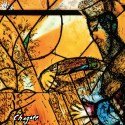
06.08.18 (Sivan 25, 5778) Perhaps you (like me) once learned Psalm 19:7 as, "The law of the LORD is perfect, converting the soul." However, the Hebrew text might better be translated as, "The instruction (i.e., Torah) of the LORD is perfect, returning the soul." This is the message of teshuvah (תְּשׁוּבָה), or "repentance." We turn away from ourselves to discover that only the love of God given in Yeshua gives life to our dead hearts (Mark 1:15). Teshuvah is therefore first of all a matter of faith, of trusting in the miracle of God. And though it is indeed a great gift from heaven, it requires that we pass through the "narrow gate" of humility by confessing the truth about who we are (Matt. 7:13). We turn away from our pride; we acknowledge our inner poverty, our neediness, and we mourn over the loss and hurt caused by our sin. Teshuvah turns us away from our attempts to defend or justify ourselves and instead turns to God to heal our separation from love (Rom. 8:3-4). The miracle of love buries our old nature and transforms us into a new creation (2 Cor. 5:17).
תּוֹרַת יְהוָה תְּמִימָה מְשִׁיבַת נָפֶשׁ
עֵדוּת יְהוָה נֶאֱמָנָה מַחְכִּימַת פֶּתִי
to·rat · Adonai · te·mi·mah · me·shi·vat · nafesh
ei·dut · Adonai · ne·e·ma·nah · mach·ki·mat · pe·ti

"The Torah of the LORD is perfect, returning the soul
The testimony of the LORD is reliable, making wise the simple."
(Psalm 19:7)

Download Study Card
Faith's Projection...

06.08.18 (Sivan 25, 5778) The spies said, "we seemed to ourselves like grasshoppers, and so we seemed to them" (Num. 13:33). Here the sages note the subtle - yet profound - connection between how we see ourselves and how we imagine that others see us... This sort of "projection" is common enough in everyday life. However, while it may be valid for you to sometimes feel small, inadequate, and even "grasshoppery," it is not valid to claim that this is how you are regarded by others. After all, how do you know how you appear to others? And, moreover, what difference does that make in light of who God says you are? In other words, who or what defines you? Do you need the approval of man to exist, or the approval of God? Worrying about how others see you, seeking your self worth among the fickle passions of men, is cowardly, carnal and self-centered. When the spies said that "the land devours it inhabitants" (Num. 13:32), they projected their own hidden fears. Instead of seeing God at work, preparing the way for the Israelites to more easily conquer the land, the spies saw only themselves, and that led to the irreparable sin of unbelief...
We lose sight of what is real because we want the blessing on our own terms, apart from the miracle... The legalist is actually enslaved to the idea of God's conditional acceptance: "If you obey, then you belong." There is still some faith that the right religious scruples, the affirmation of a particular creed, and the practice of certain rituals will gain us access to His heart. The message of the cross scandalizes the religious because it boldly states, "if you believe, then you belong." As Kierkegaard rightly observed, "And this is the simple truth - that to live is to feel oneself lost. He who accepts it has already begun to find himself, to be on firm ground. Instinctively, as do the shipwrecked, he will look around for something to which to cling, and that tragic, ruthless glance, absolutely sincere, because it is a question of his salvation, will cause him to bring order into the chaos of his life. These are the only genuine ideas; the ideas of the shipwrecked. All the rest is rhetoric, posturing, farce." For Kierkegaard, religious rituals devoid of a sense of crisis within the heart are little more than a sham. "I think of the times I tried to use him to make my life secure, and undisturbed, and painless. Also the times I was enslaved by fear of him, and by the need to protect myself against him through rites and circumstances" (de Mello). Ritualistic behavior is a tawdry substitute for trusting that His heart is forever present for you.
Joshua and Jesus (יהושע וישוע)
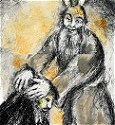
[ The following is related to this week's Torah reading, parashat Shelach... ]
06.08.18 (Sivan 25, 5778) Before sending out the leaders of the tribes to spy out the land, Moses renamed his trusted servant Hoshea (הוֹשֵׁעַ) to Yehoshua (יְהוֹשֻׁעַ), appending the letter Yod (י) to make his name begin with a divine prefixive (יָהּ־). The Talmud (Sotah 34b) states that Moses foresaw the treachery and faithlessness of the spies and appended the Yod to remind Hoshea that YHVH (יהוה) must come first. This renaming of Hoshea, however, was certainly prophetic, since Joshua was chosen to be the successor of Moses who would finally lead the people into the promised land. Notice that the name Yehoshua (i.e., Joshua) and Yeshua (i.e., Jesus) come from the same root (i.e., yasha: ישׁע) meaning "salvation" or deliverance (in the Greek LXX, Joshua is spelled Ιησους, the same spelling for Jesus in the New Testament). Indeed, in the Book of Nehemiah, Yehoshua is explicitly called Yeshua (יֵשׁוּעַ), the name often transliterated as "Jesus" (Neh. 8:17).
Of course there are a number of fascinating similarities between Joshua and Jesus given in the Torah. For example, Joshua was a descendent of Joseph from Ephraim (lit., "double fruit"), and Yeshua came as Messiah ben Yosef, the "son of Joseph" who would come from Bethlehem of Ephrata (אֶפְרָתָה), a term that also means "fruifulness." Joshua was Moses' faithful companion at Sinai (Exod. 24:13) and overseer of the "Tent of Meeting" (אהל מועד), taking every opportunity to be near God's presence (Exod. 33:11). He was a capable commander of the armies of Israel who regularly routed the enemy in battle (Exod. 17:9, etc.). Joshua was truly humble and of impeccable moral character, a true servant of Israel filled with Holy Spirit of God (Num. 27:18). Therefore both Joshua and Yeshua loved God's house (Exod. 33:11; Luke 2:49), both were faithful leaders of Israel (Deut. 1:37-38; Matt. 2:6); and both were directly ordained by God. Moreover, Joshua was tested and found steadfast in his faith (Num. 32:12); he was willing to be "despised and rejected of men" rather than appease the mob, just as was Yeshua.
For more on this, see: "Joshua and Jesus: Further thoughts on Shelach Lekha."
Note: I am back from my travels and I thank all of you who might have prayed for me during this time. Your prayers and kindness truly support the Hebrew for Christians ministry.
Small in our Eyes...

06.07.18 (Sivan 24, 5778) Our Torah portion this week (i.e., Shelach) is a "heavy one" since it focuses on the Sin of the Spies and the subsequent failure of the people to trust that God would care for them. The people's lack of bittachon in God is the most serious sin recorded in all the Torah, even more serious than the sin of the Golden Calf. This is confirmed by the testimony of the New Testament, which presents the fate of the Exodus generation as the dire warning of apostasy for those who claim to follow the Messiah (Heb. 3:7-4:2).
Notice, however, that in order to trust God, you must believe that you are valuable to Him and that He genuinely desires relationship with you. God redeemed you so you could know and love Him. In this connection it is important to notice that the spies said, "we were in our eyes like grasshoppers" (Num. 13:33). They felt small because they had forgotten the reason for their redemption - they had forgotten how much they meant to God. Their lack of self-respect made them feel unworthy of the inheritance. The sin of the spies was not simply that they doubted they could overcome the "giants in the land," but rather that they were worthy people in God's eyes... Sadly the spies view of themselves was more real to them than God's view of them, and that is why they added, "and so we were (like grasshoppers) in their eyes." From a spiritual point of view, this was profoundly tragic...
One lesson we can learn from the unbelief of the spies is that we must be careful to esteem ourselves properly. We are created b'tzelem Elohim (in the image of God), and that is the starting point for everything else revealed in the Torah. This foundational idea may be expressed as "respect precedes Torah." Self-esteem and self-worth are very important characteristics because they enable the soul to receive the Word of God. This isn't a selfish, narcissistic type of love. If you have no self-worth, then it is likely you will believe the promises of Scripture are for other people, but not for you. You will regard yourself as an "outsider" or "alien" who is without promise of inheritance. So we have to begin there, with the fact that God created you in His image and therefore you are of infinite value. You matter to God - and therefore you must respect yourself. It is no mark of holiness to shame or belittle yourself - notwithstanding your sinful nature - since you have a duty to honor yourself as one of God's created children. Dishonoring yourself violates the central ethical commandment of the Torah: "You shall love your neighbor as yourself" (Lev. 19:18). How can you respect others if you don't respect yourself? You will regard yourself as "insect like" and will tend to view others as "gigantic" threats; you will act defensively and walk in fear of other people.... This is the path of a person living in a prison of fear, and it is a type of hell. Trusting in God's personal love for you presupposes that you are worthy to be loved and that there is a divine inheritance for you. This gives you real courage to go take possession of the land as its rightful heir. Trusting in God means regarding God's view of you as more real than your own. It means allowing yourself to be "drawn close" so that you can be in a genuine love relationship with your Heavenly Father. "From now on, therefore, we regard no one (including ourselves) according to the flesh..." (2 Cor. 5:16).
We "walk by faith, not by sight," which means we must take hold of the promise of God, even in a world that "devours its inhabitants" and that is filled of seemingly invincible giants... Faith believes the possible, even in moments of testing and struggle. As Yeshua said, "All things are possible for the one who believes" (Mark 9:23).
Spying with little eye...

06.06.18 (Sivan 23, 5778) Which will you choose to believe - the "spying eyes" of the flesh, or the Word and promise of the LORD God Almighty? The "eyes of the flesh" focus on this world and its possibilities (חַיֵּי שָׁעָה) and are therefore unable to discern beyond mere surface appearances. They are easily seduced by superficialities and glitter of this world and its vanities (עוֹלָם הַשֶּׁקֶר). The eyes of faith, on the other hand, "look not to the things that are seen but to the things that are unseen. For the things that are seen are transient, but the things that are unseen are eternal" (2 Cor. 4:18). Faith sees the realm of the invisible (חַיֵּי עוֹלָם): For we "walk by faith, not by sight." We are "saved by hope," but hope that is seen is not hope (Rom. 8:24-25). Faith is the foundation (ὑπόστασις) of things hoped for, the conviction (ἔλεγχος) of things (πρᾶγμα) not seen" (Heb. 11:1).
In our Torah portion this week, the people had trekked across the desert of Paran for several days, with their camps ordered in military precision. The Ark of the Covenant was in their midst and the Shekhinah Glory filled the desert skies. Now the people were at Kadesh Barnea (קָדֵשׁ בַּרְנֵעַ), about 11 days out from Sinai and about three days to the border of the promised land... The great promise of Zion was finally within reach! But then a dark misgiving arose within the heart of the people... fear ... the old whisper of the enemy was heard in the desert wind: "has God really said...?" (Gen. 3:1). In light of the events of the great Exodus, the mistrust of the people demonstrates that miracles are insufficient to sustain our faith. "An evil and adulterous generation seeks for a sign." Seeing isn't believing, but rather the other way around. Yeshua made this point in His parable of the rich man and Lazarus (Luke 16:19-31). Even if a person should encounter someone literally risen from the dead it wouldn't suffice to impart true faith (Luke 16:31). The great sin that so angered God to declare: "I swore in My wrath, they shall not enter into My rest..." was not that of the Golden Calf, as dreadful as that was, but rather the sin of unbelief.... "So we see that they could not enter in because of unbelief. Let us, therefore, fear lest, a promise being left us of entering into His rest, any of you should seem to come short of it" (Heb. 3:7-4:2).
Honesty and Faith (כנות ואמונה)

[ The following concerns this week's Torah reading, parashat Shelach Lekha... ]
06.06.18 (Sivan 23, 5778) In the Torah we read that the LORD said to Moses, "Send for yourself (שְׁלַח־לְך) men to spy out the land" (Num. 13:2), which the sages traditionally interpreted to mean that it was not God's decision to send the spies, and indeed later we learn that it was the people who had persuaded Moses to send the scouts ahead: "Then all of you came near me and said, 'Let us send men before us, that they may explore the land for us and bring us word again of the way by which we must go up and the cities into which we shall come.' The thing seemed good to me, and I took twelve men from you, one man from each tribe" (see Deut. 1:22-23). Moses consented with the people's request because he (mistakenly) believed they were sincere in their desire to discover the best way to ascend to the land. The people were dishonest with themselves, however, and merely pretended to be concerned about logistics and strategy. Their real motive was not to discover the way of ascent, but rather to discover whether God could be trusted... Had the people been honest with themselves, confessing their fear, they might have found opportunity to repent, but because they denied the truth and hid it from themselves, they were unable to go forward. Without honesty faith is impossible. We must trust, but if we cannot do that, then we need to confess our brokenness there - in the midst of our fears... God is so good that he runs to us, as the prodigal's father in the story, to meet us in our weakness...
The eyes of your heart (העיניים של הלב)
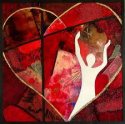
[ The following concerns this week's Torah reading, parashat Shelach Lekha. Please read the Torah portion to "find your place" here. ]
06.05.18 (Sivan 22, 5778) "We walk by faith, not by sight." This is true for all people, since every soul lives by faith of some kind or another. Our Torah portion this week (Shelach) begins with the episode of the spies and concludes with the warning not to "spy after your heart and after your eyes" (Num. 15:39). The Torah mentions the heart first and then the eyes to indicate that the eyes follow the heart. We see as we believe with our heart: "According to your faith be it done unto you." When the spies said, "We are not able to go up (לא נוּכַל לַעֲלוֹת)... for they are stronger than us" (Num. 13:31), they revealed their unwillingness to believe in God's promise, or, to put it another way, they revealed their faith in God's inability to deliver on his word.... Indeed, the Hebrew word for "than us" (מִמֶּנּוּ) can also mean "than Him," suggesting that the spies believed that even God would be unable to uproot the Canaanites. According to their faith, so it was done; by believing that it was impossible, they lost the possibility of God's promise...
Faith sees the real possibility of truth's fulfillment and consequently refuses to yield to the artificiality of mere appearance. Indeed, appearances are often a test of our courage. We may never know how often a test was given and - just before victory was manifest - the heart grew faint and was lost to fear. "According to your faith be it done to you" is a spiritual principle that applies to everyone. In that sense, it is not that we have faith that matters (since we all do), but whether our faith is grounded in the promises and power of the LORD God of Israel, or something else....
אָמַרְתְּ לַיהוָה אֲדנָי אָתָּה
טוֹבָתִי בַּל־עָלֶיךָ
a·mart · la·do·nai: · A·do·nai · at·tah
tov·va·ti · bal - a·ley·kha

"I say to the LORD, "You are my Lord;
I have no good apart from you."
(Psalm 16:2)

Hebrew Study Card
What We Value Most...

06.05.18 (Sivan 22, 5778) What we fear says a lot about us, since fear is closely linked to what we value and ultimately worship... All the world is lit up with the radiance of God our Savior. Fearing lesser things blinds us to the truth of Reality and glorifies the realm of darkness. The world system is based on slavery to such lesser gods and fears, but we are to walk in the awe of the LORD God Almighty alone, and the light of his reverence overcomes the fear of this world. As the Gerer Rebbe said: "If a man has fear of anything except the Creator, he is in some degree an idolater. For to fear is to offer worship to the thing feared, and this form of worship may be offered only to the LORD."
אֶת־יְהוָה אֱלהֶיךָ תִּירָא
וְאתוֹ תַעֲבד וּבִשְׁמוֹ תִּשָּׁבֵעַ
לא תֵלְכוּן אַחֲרֵי אֱלהִים אֲחֵרִים
מֵאֱלהֵי הָעַמִּים אֲשֶׁר סְבִיבוֹתֵיכֶם
כִּי אֵל קַנָּא יְהוָה אֱלהֶיךָ בְּקִרְבֶּךָ
et · Adonai · E·loh·hey·kha · tee·rah
ve·oh·toh · ta·a·vohd · oo·veesh·moh · tee·shah·vei·a'
loh · tei·le·khoon · a·kha·rei · e·loh·heem · a·chei·reem
me·e·loh·hei · ha·a·meem · a·sher · se·vee·voh·tey·khem
kee · el · ka·nah · Adonai · E·loh·hey·kha · be·keer·be·kha

"It is the LORD your God whom you shall fear.
Him you shall serve and by his name you shall swear.
You shall not go after other gods,
the gods of the peoples who are around you
for the LORD your God in your midst is a jealous God."
(Deut. 6:13-15)
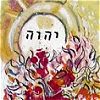
The fear of the Lord, yirat Adonai, is reverent awe and honor that resembles the great trembling of love: mekudeshet li: "With this ring I do consecrate thee..." The Scriptures repeatedly state that this fear is reishit chochmah (רֵאשִׁית חָכְמָה) – the "beginning of wisdom" and the foundation of all true godliness and obedience.... Sin always entices us to fear the "lesser gods"; it seduces us to live in arrogance, pride, anger, envy, lust, despair, and so on. Sin expresses the opposite of godly reverence and seeks to justify cowardly indolence so that people learn to actually "love" and defend what enslaves them...
Fearing lesser gods is an affront to the glory and majesty of our Savior. We are commanded to be full of courage given by God's own spirit: It is the Lord who goes before you. He will be with you; he will not leave you or forsake you. Do not fear or be dismayed" (Deut. 31:8). "Have I not commanded you? Be strong and courageous. Do not be frightened, and do not be dismayed, for the Lord your God is with you wherever you go" (Josh. 1:9).
The fear of the LORD expresses the power of faith to repel the schemes and designs of the devil. Then Jesus said to him, "Be gone, Satan! For it is written, 'You shall worship the Lord your God and him only shall you serve'" (Matt. 4:10). "Submit yourselves therefore to God. Resist the devil, and he will flee from you" (James 4:7). Ultimately, the fear of the LORD is a great gift, the underlying motive of all true teshuvah (repentance).
When the people heard the Voice of the LORD thunder at Sinai, they drew back in fear and appealed to Moses to be their mediator: "You speak with us and we will listen, but let not God speak with us, for we might die" (Exod. 20:19). Moses replied, "Do not be afraid, for God came in this way to test you and in order that His fear should remain before you, so that you do not sin" (Exod. 20:20). The point of fearing God, then, is to keep us from what separates us from the love of God. The Kotzker Rebbe commented: "When Moses exhorted the people not to be afraid, he meant that the fear "for we might die" was not what God wants from us. Rather, God desires that the fear of Him should remain before you so that you do not sin. That is the only true fear of heaven." The "fear of the LORD" is that we might lose sight of what we really need for life...
 |
The Test of Faith (מבחן האמונה)

[ The following concerns this week's Torah reading, parashat Shelach Lekha. Please read the Torah portion to "find your place" here. ]
06.04.18 (Sivan 21, 5778) From our Torah this week (Shelach Lekha) we read about the report of the spies: "They (the spies) returned... and brought word and showed them the land's bounty. And they said, "We came to the land to which you sent us. It flows with milk and honey (זָבַת חָלָב וּדְבַשׁ), and this is its fruit. Nevertheless the people who inhabit the land are powerful; the cities are greatly fortified, and we also saw the (giant) people of Anak there... We are unable to go up against the people there, for they are stronger than we are ... and moreover the land itself consumes its inhabitants" (Num. 13:25-32). The Kotzer rebbe asked, "Did the spies lie? Did they invent words that were untrue? Behold, they spoke as they saw it, so how did they sin?" Yet not everything that is not a lie is truth: you may have all the facts "correct" and yet still speak untruth. Truth is therefore something more than the description of appearances (correspondence) since what appears is constrained by what is ultimately real. The truth of future tense propositions (e.g., "It will not rain tomorrow"), counterfactual conditionals ("If it had not rained yesterday then we would have gone to the zoo"), probabilistic predictions ("There is a 50% chance it will rain tomorrow), etc., are are based on inferences from what is observed or seen to what is not seen, and therefore they are all grounded in faith that the future will resemble the past, that the laws of nature are constant, and so on. Language about possibilities, probabilities, expectations, outcomes, and so on all turn on the question of faith. Our Torah portion this week illustrates the responsibility we have to trust in the divine good and the promises of God, regardless of phenomenological appearances...
So what about the trouble, testing, pain, hardship in our lives? How do we deal with these without losing heart? Only God can help us, friend... In this life, where our "outer man perishes" we will experience the "existential pathos" of the life of faith. That is the test. We may feel abandoned by God, or forgotten, or of complete insignificance, or sinful, vile, hopeless confused, and so on, and yet the heart of faith cries out: "Though he slay me, yet will I trust in him" (Job 13:15). Faith is able to see beyond the temporal to the eternal... It finds comfort in God's blessing to endure the ambiguities of this world. May the LORD God Israel, Yeshua our Messiah, strengthen us all. Amen.
 |
Tragedy and Unbelief...

06.03.18 (Sivan 20, 5778) Our Torah reading for this week, Shelach Lekha (שלח־לך), recounts how Moses sent twelve spies from the region of Kadesh into the land of Canaan to search it out and give a report of its condition. The spies returned 40 days later extolling the land, saying that was indeed fruitful and zevat chalav u'devash (זָבַת חָלָב וּדְבַשׁ), "flowing with milk and honey." However, ten of the spies also gave a discouraging report, indicating their lack of confidence that the people could conquer the land. Only Joshua (יְהוֹשֻׁעַ) and Caleb (כָּלֵב) kept faith in God's promise. Upon hearing the report of the ten spies, however, the people rebelled and cried out to return to Egypt. Angered by their lack of faith, God sought to destroy the people, but Moses interceded on their behalf. The LORD then decreed to lengthen the Israelites' wandering in the desert to 40 years -- one year for each day the spies were in the land -- until all of the faithless over the age of 20 would die in the desert, except for Joshua and Caleb, the two spies who kept faith with the LORD. After hearing the judgment of God, a group of remorseful Israelites decided to "repent" by taking matters into their own hands. Without either the "Ark of the Covenant of the LORD" or Moses' leadership, they presumptuously decided to storm a mountain on the border of land but were decisively routed by the Amalekites and Canaanites.
If last week's Torah might be called "sefer kvetch" (the book of complaint), this week's Torah reveals the fateful outcome... The people's lapse of faith in God's power serves as a profound and very sober warning, and indeed is a primary warning regarding the dreadful sin of unbelief in the New Testament (see Heb. 3:7-4:11). Indeed, Jewish tradition states that the decree that "none of the men who had seen my glorious Presence and my signs I performed in Egypt and in the desert will see the land that I swore to give to their fathers" (Num. 14:22-23) was given on the Ninth of Av (i.e., Tishah B'Av), and was prophetic of the destruction of the Temple and the worldwide exile of the people from the Promised Land. The sin of unbelief may rightly be regarded as the "unpardonable sin" of the Torah...
The tragedy of the sin at Kadesh ultimately has a happy resolution, however, since the LORD is never thwarted by man's sin and weaknesses. After the 38 years of exile were complete, Moses' faithful successor Joshua (יְהוֹשׁוּעַ) sent a second spying expedition to the promised land, though this time God led the spies to a prostitute named Rahab (רָחָב), a direct ancestor of Yeshua the Messiah, who later identified her faith in the LORD's victory by displaying the scarlet cord (חוּט הַשָּׁנִי) during the fall of Jericho (Joshua 2). Rahab was the (grand)mother of Boaz, who later married Ruth, the great grandmother of King David. May God likewise give us courage to walk in the power of His promises, even if our present circumstances seem daunting. May the LORD clothe each of us with the "spirit of David" to stand before all the giants of the land who defy the LORD and His power.
Note: There will be no "Shavuah Tov" audio broadcast for this week because I am traveling. Thank you for your understanding.
Our Holy Desperation...

06.01.18 (Sivan 18, 5778) Do you have the "gift of holy desperation"? That's the special blessing of needing God so viscerally that you otherwise will fall apart or self-destruct apart from His daily intervention in your life... Do you sense your need for deliverance "in the kishkes," that is, in your gut? Do you pray because your very life depends on it? The Torah says that the fire on the altar was to be kept burning at all times (Lev. 6:12-13), which symbolizes esh tamid (אֵשׁ תָּמִיד), or the inner fire of the heart... How blessed it is to be full of the fire of this inner need, this relentless groaning, this constant hunger to be set free: As Job yearned: "All the days of my warfare I hope, until my change will come" (Job 14:14).
So what shall we do in the meantime, as we live in the "already-not-yet" realm of faith? In many ways we offend others. We are damaged, wounded, and much within us awaits healing. So we turn to God again and again, up to 70 x 70 times, if necessary, and keep seeking, despite ourselves. We learn to "endure ourselves" and tolerate our own imperfections, forgiving ourselves, for as long as we pretend that we are not subject to the faults common to others, we are liable to be controlled by them.
Shabbat shalom, chaverim... Keep hope alive, for our change will indeed come! Amen.
 |
Trust and Suffering (אמון וסבל)

06.01.18 (Sivan 18, 5778) Sometimes in our afflictions we may feel lost, confused, and uncertain of ourselves. We dare not doubt God's love for us, though we may wonder how He might use such affliction to mend our hearts... As C.S. Lewis once said, "We are not necessarily doubting that God will do the best for us; we are wondering how painful the best will turn out to be" (Letters of C.S. Lewis, 1964). There is a trust issue in suffering, and an intimacy that is gained through its fires. As Kierkegaard reminds us, "It is one thing to conquer in the hardship, to overcome the hardship as one overcomes an enemy, while continuing in the idea that the hardship is one's enemy; but it is more than conquering to believe that the hardship is one's friend, that it is not the opposition but the road, is not what obstructs but what develops, is not what disheartens but ennobles" (Four Upbuilding Discourses, 1844).
Amen. If you can't detect God's hand in your circumstances, then trust His heart... The heart of faith affirms: gam zu l'tovah (גַּם זוּ לְטוֹבָה): "this too is for good," particularly when the present hour may be shrouded in darkness... Whenever I am confused about life (which is often enough), I try to remember what God said to Moses after the tragic sin of the Golden Calf: "I will make all my goodness pass before you and will proclaim before you my Name, 'The LORD' (יהוה). And I will be gracious to whom I will be gracious, and will show mercy on whom I will show mercy" (Exod. 33:19). God's character does not change: the LORD is the same "yesterday, today, and forever." The meaning of the Name, however, cannot be known apart from understanding the need of the heart:
יְהוָה יְהוָה אֵל רַחוּם וְחַנּוּן
אֶרֶךְ אַפַּיִם וְרַב־חֶסֶד וֶאֱמֶת
Adonai Adonai El Ra·chum ve·chan·nun
e·rekh ap·pa·yim ve·rav che·sed ve·e·met

"The LORD, the LORD, a God merciful and gracious,
slow to anger, and abounding in steadfast love and faithfulness."
(Exod. 34:6)

Download Study Card
At the time of the awesome encounter at the "burning bush," God had revealed to Moses that the Name YHVH (יהוה) means: "He is Present" (i.e., the word is a play on the Hebrew verb hayah [הָיָה], "to be"), and therefore God is "always there" (see Exod. 3:14). The great I AM (אֶהְיֶה) means God stands outside of the constraints of time, "one day is as a thousand years" and "a thousand years as one day" before Him (2 Pet. 3:8). Just as a thousand years is but "a watch in the night" (Psalm 90:4), so one day is as a thousand years. God's Spirit broods over all things and sustains the entire universe. God is "necessary being," the Source of Life, and foundation for all other existence. God's creative love and power sustain all things in creation...
Now while the idea that God is the Source of all life in the universe is surely important, it is not entirely comforting, especially in light of man's guilt and anxiety over death. After all, we do not stand before the "god of the philosophers," but rather the personal God of Abraham, Isaac, and Jacob. The meaning of the Name YHVH - that He is merciful, gracious, slow to anger, abounding in love and truth, and so on - therefore presents additional revelation in face of man's inherent brokenness and spiritual need. Some things in life are only known in the passion of faith... things like love, beauty, honor, and so on. The Name of the LORD as the Compassionate One is only known in humility, when all human pretense is stripped away and the inner life is laid bare in its desperate need. The Name YHVH is God's response to the heart's cry for deliverance, for compassion, for mercy....
What is God like - what is His heart - is the first question, and how we answer that will determine how we deal with all the other questions that come up in theology... What do you feel inside when you stare up at the ceiling before you go to bed? In light of the ambiguity and heartaches of life we might wonder if God is there for us. Does God care? Is He angry at me? Does He really love me? This is the raw place of faith, where we live in the midst of our questions. The Name YHVH means "He is present," even when we are unconscious of His Presence in the hour of our greatest need.
Shabbat shalom and thank you for praying for Hebrew for Christians, friends...
 |
True Contentment (שְׂבִיעוּת רָצוֹן)

06.01.18 (Sivan 18, 5778) Friends, let us ask the LORD to give us hearts that are full of godly contentment, which is "of great gain" (1 Tim. 6:6). May we be walking in true spirituality (רוּחָנִיּוּת) - in the power of the Holy Spirit (רוּחַ הַקּדֶש) - by practicing emotional honesty with ourselves and with God (James 5:16). Trials and tribulations - the "squeezing of grapes" - are part of the walk of faith, but we are invited to come "boldly" before the Throne of Grace (παρρησίας τῷ θρόνῳ τῆς χάριτος) to find help for our lives (Heb. 4:16). Note that the word translated "boldly" in this verse (παρρησίας) means that we can speak honestly and freely to God from the center of the chaos of our hearts -- without fear or shame. We don't need to conceal ourselves from the Divine Light, since this is the very Light that overcomes the hidden darkness within us. Those who accept that God is in complete control of their lives are set free from the terrible burdens of fear and anger. Abiding in the truth of ahavah shlemah (אַהֲבָה שְׁלֵמָה, God's "perfect love") means that you can let go...
The Name of the LORD is "I-AM-WITH-YOU-ALWAYS" (אני איתך תמיד), which implies that we always live within God's Presence and care, even if we are sometimes unconscious of this truth (Matt. 28:20). The Heart of God cries out, "Behold I have engraved you on the palms of my hands" (הֵן עַל־כַּפַּיִם חַקּתִיךְ; Isa. 49:16). Remember the One who stretched out his hands and died for your healing; remember that he said, "Do not be anxious about tomorrow... sufficient for the day is its own trouble" (Matt. 6:34). Again, "do not be anxious for any reason, but in everything by prayer and supplication with thanksgiving let your requests be made known to God, and the healing peace of God (שְׁלוֹם אֱלהִים) - the very shalom of heaven which surpasses all understanding - will guard your hearts and your minds in Yeshua the Messiah" (Phil. 4:6-7). "He's got the whole world in his hands," and we experience inner peace when our minds are settled on Him (Isa. 26:3).
 |
Bread and Affliction...

06.01.18 (Sivan 18, 5778) Just as God humbled Israel with manna in the desert, so He humbles us. "Give us this day our daily bread and deliver us..." The purpose of affliction is ultimately good and healing: God humbles us with manna, the "bread of affliction, so "that he might make you know that man does not live by bread alone, but man lives by every word that comes from the mouth of the LORD" (Deut. 8:3). In other words, God uses tzuris to lead us to do teshuvah and accept the truth. We often pray that our problems be taken away, but God sometimes ordains these very problems so that we will turn and draw near to Him... We are being weaned from this present age to be readied for heavenly glory, for things unimaginably wonderful, soon to be revealed to you. Stay strong in the Lord, friends.
|










